Thanks, Santa! A few preliminary comments...
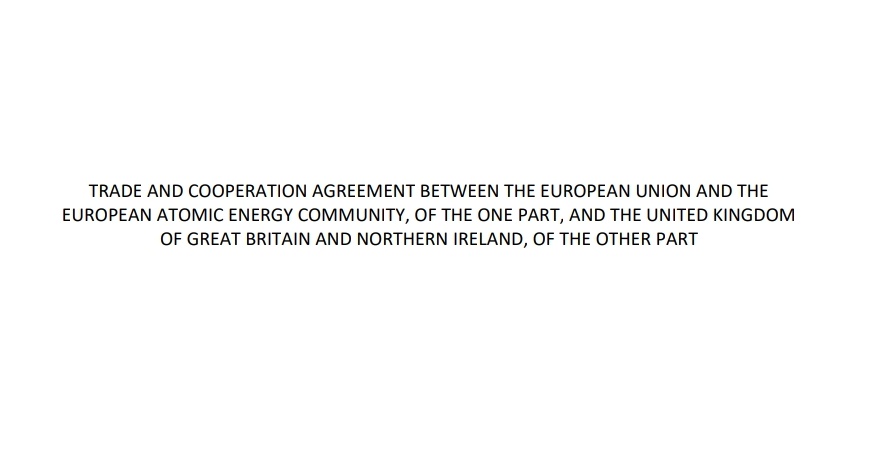
Agreement on provisional application. It ends on February 28th but the EU and UK can agree to amend that date.
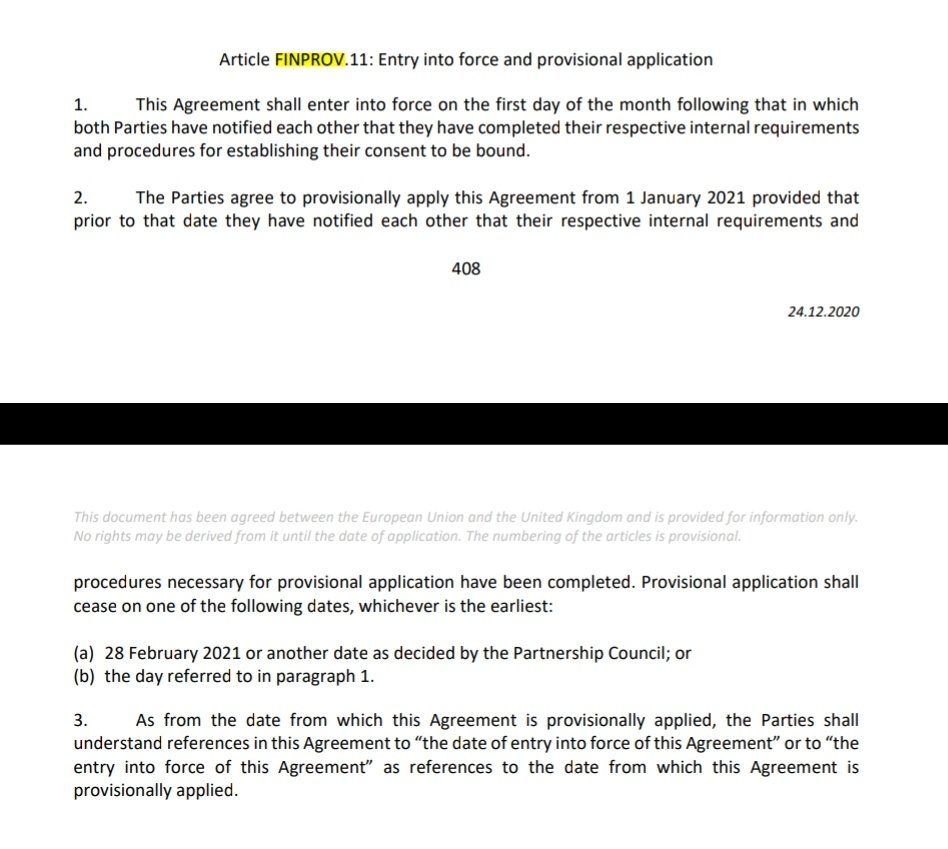
Dates to come up with a final version of the text in English and in EU languages.
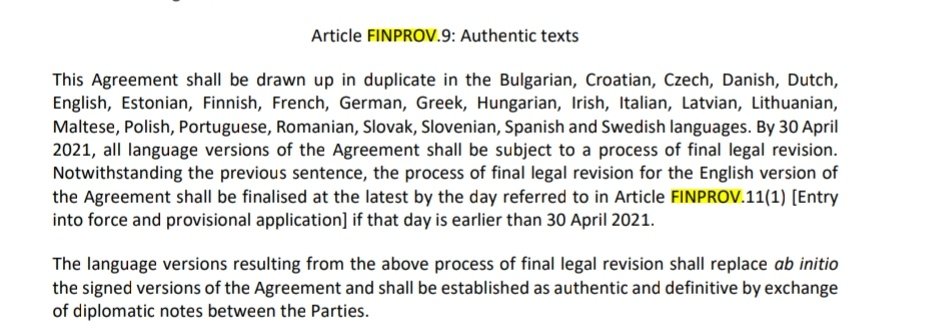
Either side can terminate the agreement; it ends 12 months later. (Remember the withdrawal agreement, which is separate, only provides for termination as regards the N Ireland protocol). No automatic termination on human rights grounds, but some special rules re criminal law.

The UK will be consulted over new countries applying to join the EU. Not a veto. The agreement might be amended to take account of enlargement (this is common with EU FTAs). Special rules on tourist visas re new Member States.
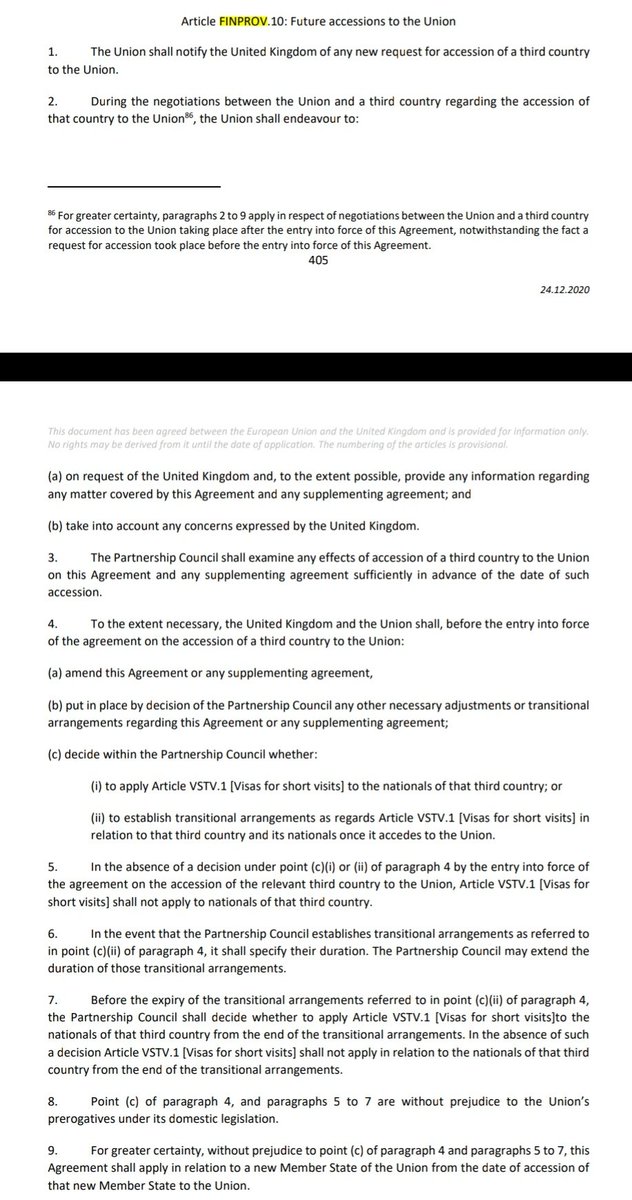
One minute notice for data protection nerds to assemble...
Transition period for data protection. Data flows continue unchanged to the UK for four months, extendable to six months, as long as the UK makes no major changes to its law. This gives time for the EU Commission to adopt an adequacy decision, which could cut the period short.
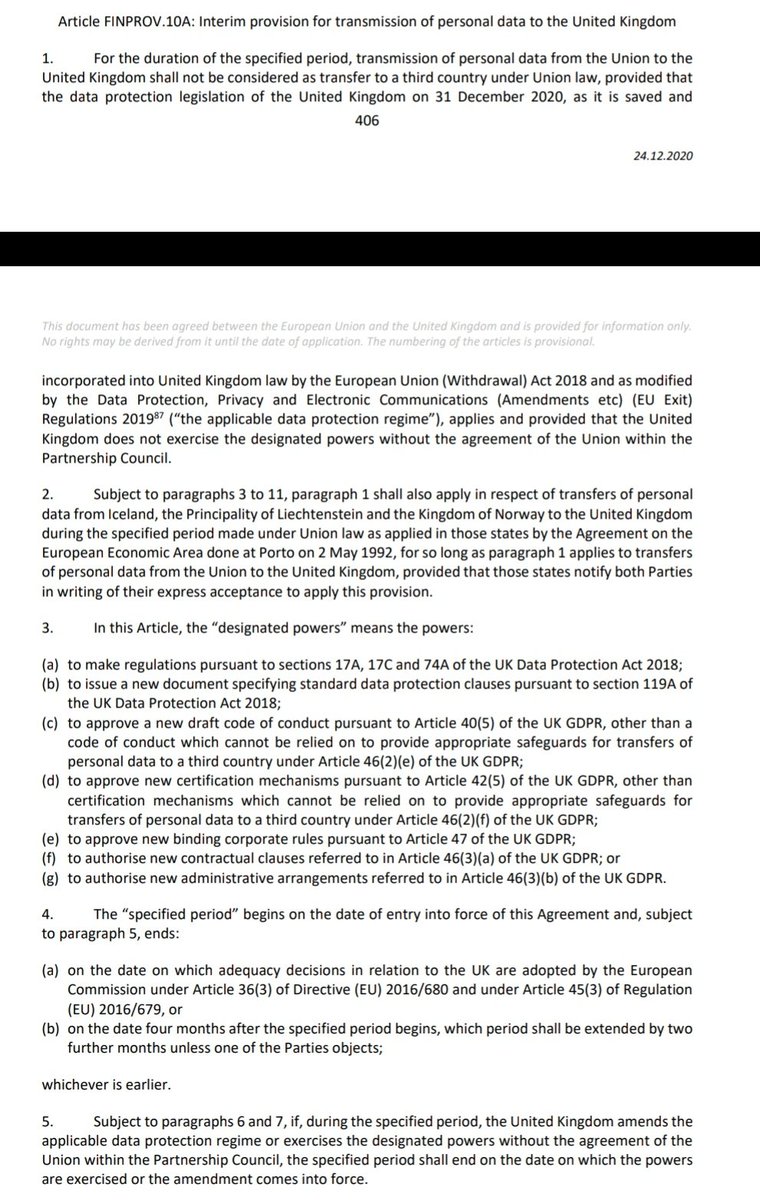
Territorial scope. Bits apply to the Channel Islands and Isle of Man. Including some fish bits. (Fish whispering MPs, look away now). Nothing to UK overseas territories. Separate talks are underway re Gibraltar.
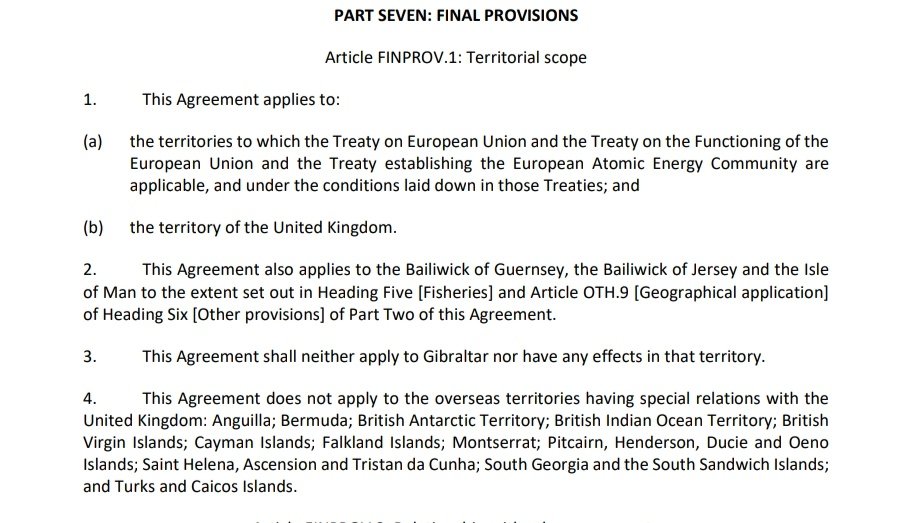
It's Home Alone 2 time, so I'll leave it there for now. More tomorrow!
As a taster, here's the future level playing field clause. More on this tomorrow...
Full text of #BrexitDeal is public here. More details from me Saturday
Seems to be paywalled though...
Here's a non-paywalled copy of the #BrexitDeal - h/t @jonfeatonby
Here's an official link to the text of the #BrexitDeal
More official texts from the EU side. There are two more separate agreed UK/EU treaties besides the Trade and Cooperation Agreement. 1 nuclear energy treaty: https://t.co/PAuyc2ZXjm 2 security information treaty:
ec.europa.eu/transparency/r…
ec.europa.eu/transparency/r…
Here are the joint declarations to the trade/cooperation treaty - https://t.co/Adip3yiy5r includes declarations on financial services, tax, State aid/subsidies, transport, asylum/returns, law enforcement, EU programmes, data protection
ec.europa.eu/transparency/r…
Some of the joint declarations. Here's asylum/returns. UK didn't get anything on readmission or child asylum seekers as requested. Simply a reference to the UK's intention to start bilateral talks with Member States.
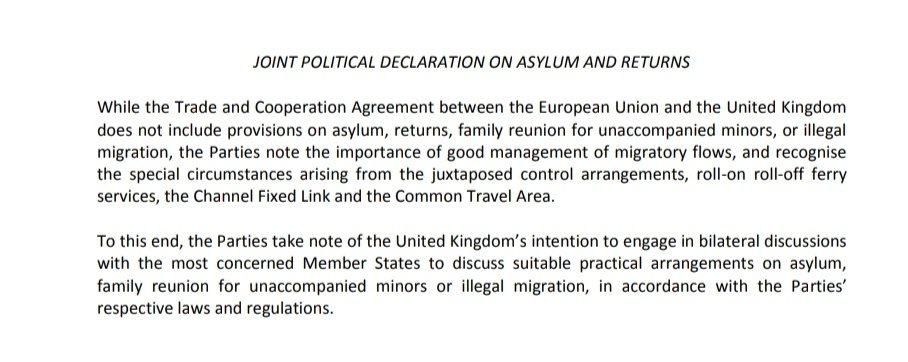
UK Home Secretary: when the Dublin system ends for the UK we will be able to send non-EU citizens back to the EU more quickly EU:
Here's an analysis of the readmission treaty which the UK had proposed - https://t.co/PJHtcnMSTY (this might still be the basis of bilateral talks with Member States, if they're interested) My summary of the Dublin system which the UK is leaving -
eulawanalysis.blogspot.com/2020/08/analys…
ukandeu.ac.uk/the-dublin-reg…
UK participation in EU programmes - research, space, NI peace process. This goes on to include an agreed protocol with legal details which will be officially adopted shortly.
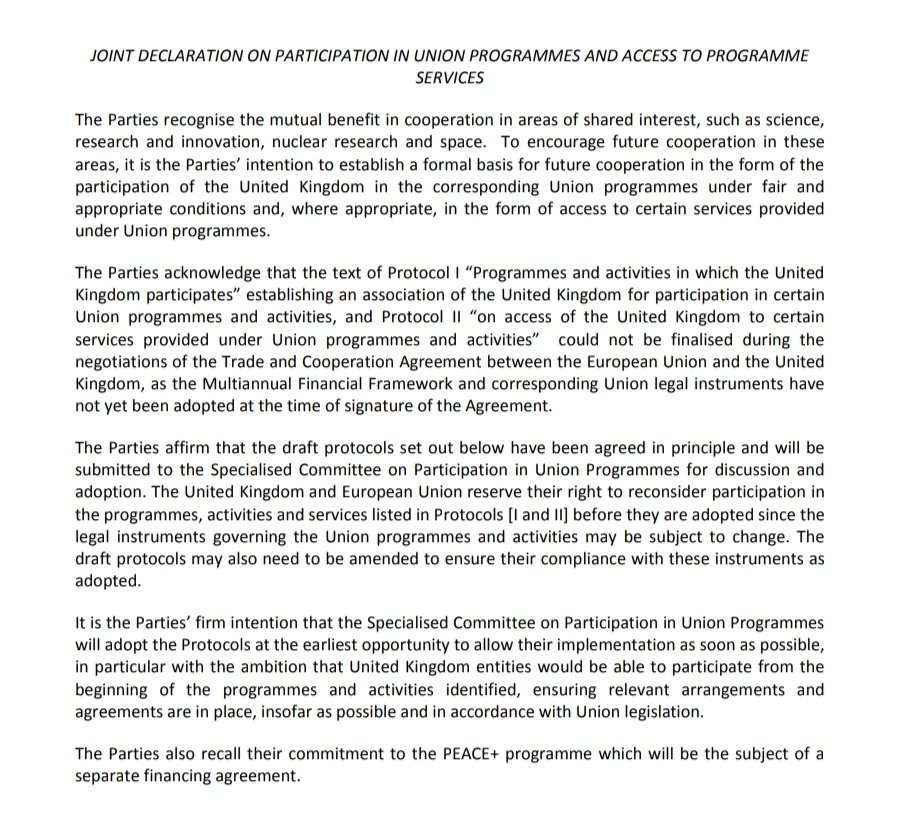
EU legislation on many EU programmes was agreed in principle between EU Council/European Parliament over the last two weeks. Formal adoption in early new year. So odds of white knight Guy Verhofstadt changing the text so Erasmus applies unilaterally to UK students are...not high
EXCLUSIVE footage of Remain Twitter getting excited by another grandstanding tweet by Guy Verhofstadt
Here's the EU side proposal to sign the treaty - https://t.co/R3p2OwXK8f Notice that despite its title, this will be an 'association agreement' on the EU side (Article 217 legal base). EU Commission will have powers over trade remedies etc on EU side.
ec.europa.eu/transparency/r…
I'll return to the text of the main trade/cooperation treaty after this beverage break
Right at the beginning, so the ERG folks read it first...the bits emphasising that the treaty is international law and can't be invoked as such in domestic law etc.
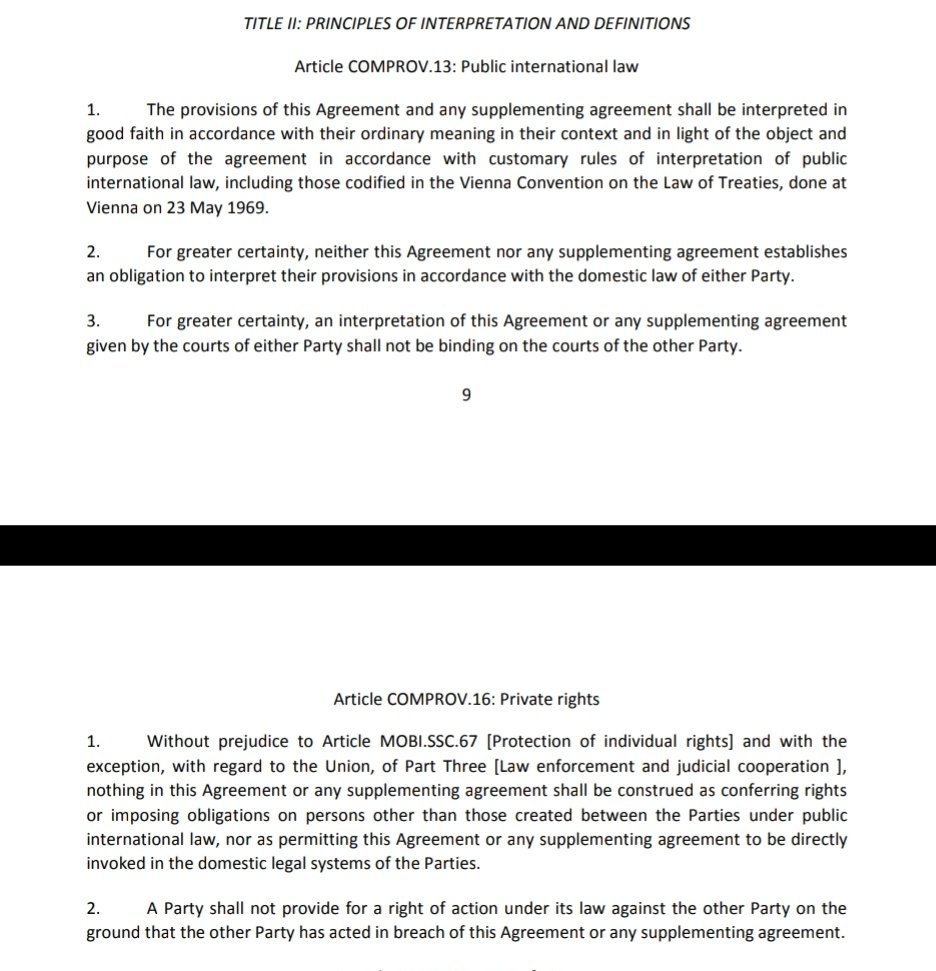
Remember that the withdrawal agreement, which continues to exist separately, is a different kettle of fish in terms of domestic law, links to the CJEU etc - relevant to Northern Ireland and citizens rights in particular.
In the trade/cooperation treaty, the CJEU only pops up as regards jurisdiction over participation in EU programmes.
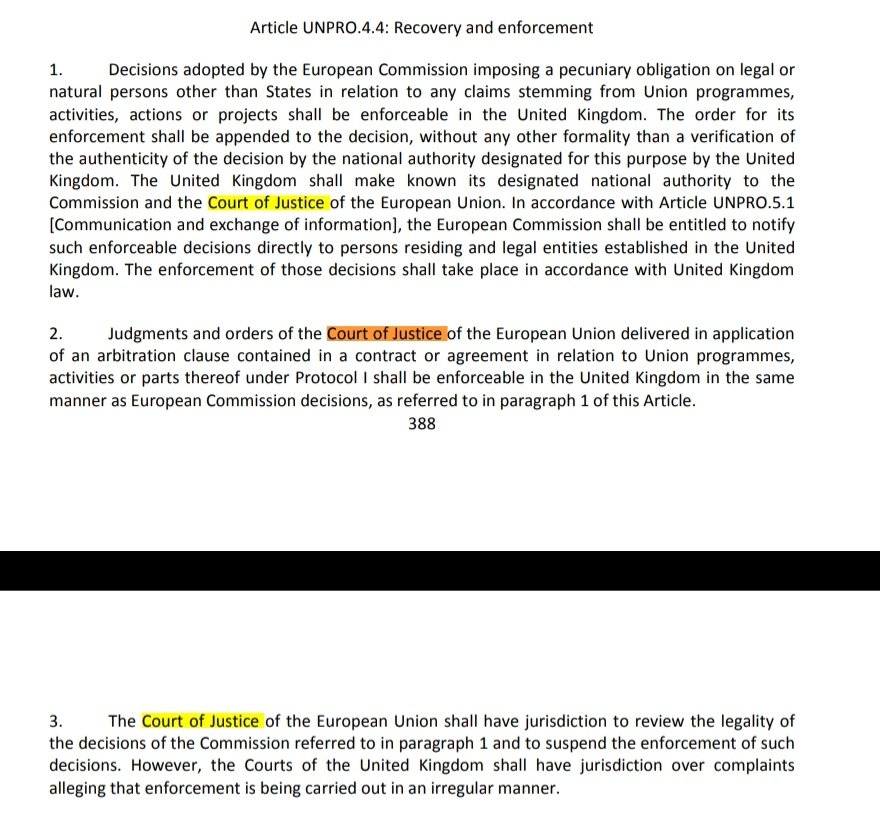
The institutional framework: a Partnership Council, made up of representatives of the UK and EU, supported by committees. Standard international treaty stuff (cf WTO, withdrawal agreement Joint Committee).
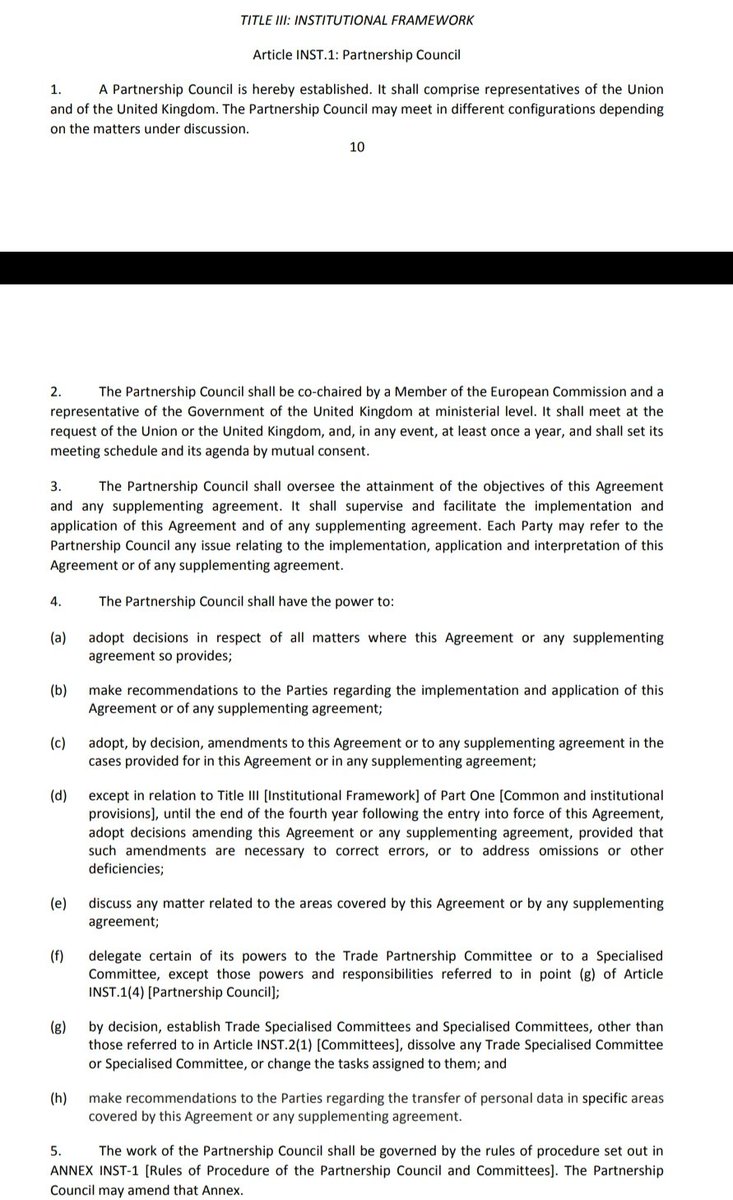
Moving on to Part Two - trade, fishing, transport, social security, visas. Officially a free trade agreement for goods and services. ("The deal excludes services" = bad take. Fair to say it has *limited provisions* on services). Note WTO case law to be taken into account.
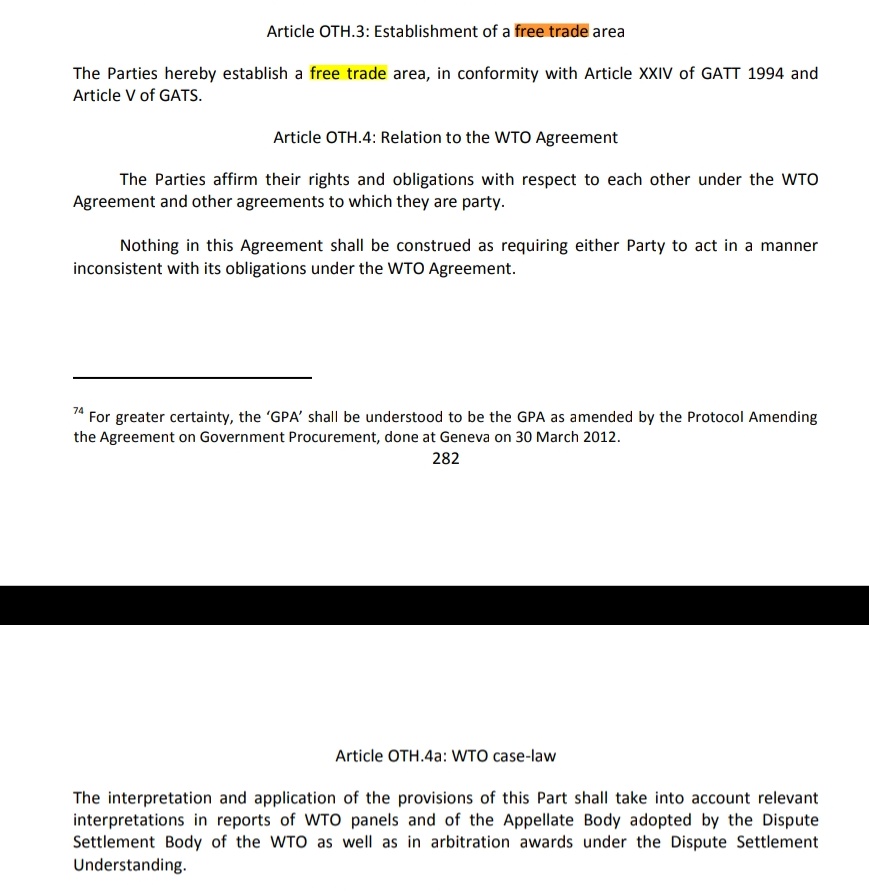
A quick flashback to this bit before I continue on trade. This clause seems to be raising interest in Scottish independence circles. Note that it calls for UK/EU *discussions* in the event of future accessions to the EU. NOT a UK veto.
In blunt political terms: any unionist claim that rUK could veto a Scottish application to join the EU via this clause would be a lie. But also, for indy supporters to call this clause an attempt by Westminster to block the process would be OTT. It's modest in scope and effect.
Leaving the merits of both issues aside, of course there would be issues for rUK and EU to discuss in the event of a Scottish application to join the EU. And rUK would be advocating for its own interests regardless of whether this clause existed or not.
As for the "UK will cease to exist" claim, that's an issue for the international law of state succession. I note, however, that the UK continued to exist after Ireland left; and that the parallel "the EU is doooomed without the UK" take of Brexity folks has not aged well.
Back to free trade in goods. Here are the core rules. Zero tariffs; other customs charges possible; non-discrimination compared to domestic companies re tax and regulation; transit clause; latter two rules incorporate WTO law.
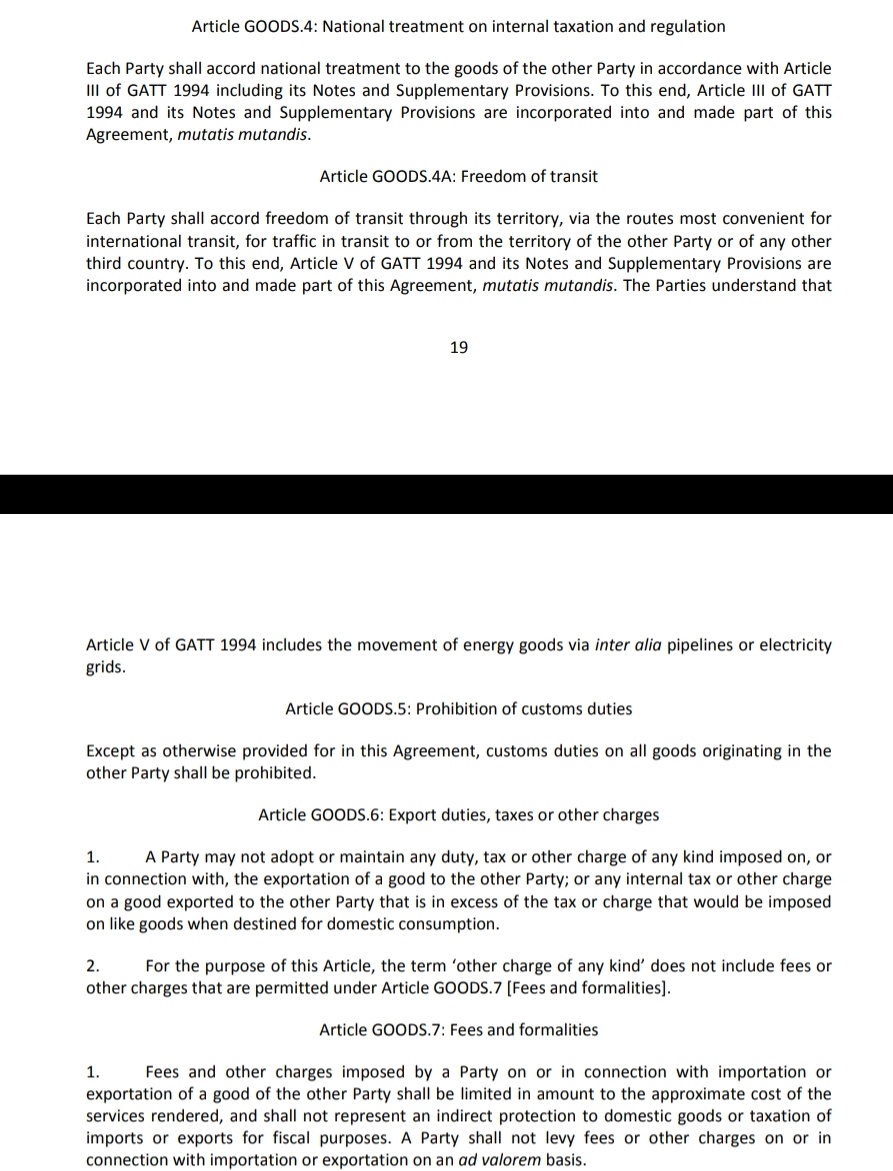
Quotas on goods also banned, also incorporating WTO law. (Remember that reference to taking WTO case law into account; it will relevant where WTO law is incorporated like this).
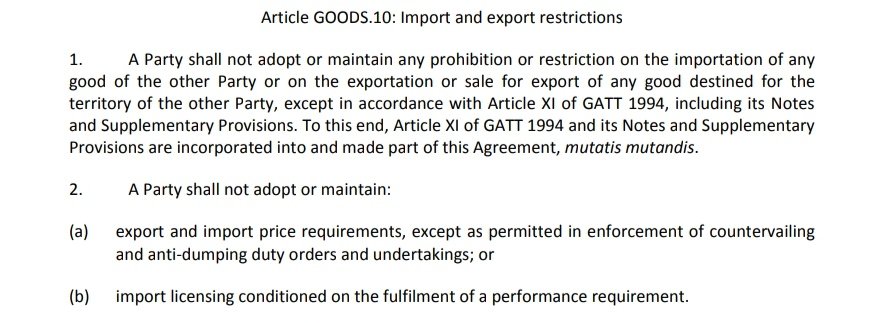
EU and UK can apply anti-dumping duties, anti-subsidy measures, economic safeguard measures between them. These possibilities for trade friction do NOT exist between EU Member States. This is usual for FTAs though: US and Canada frequently argue about subsidies.
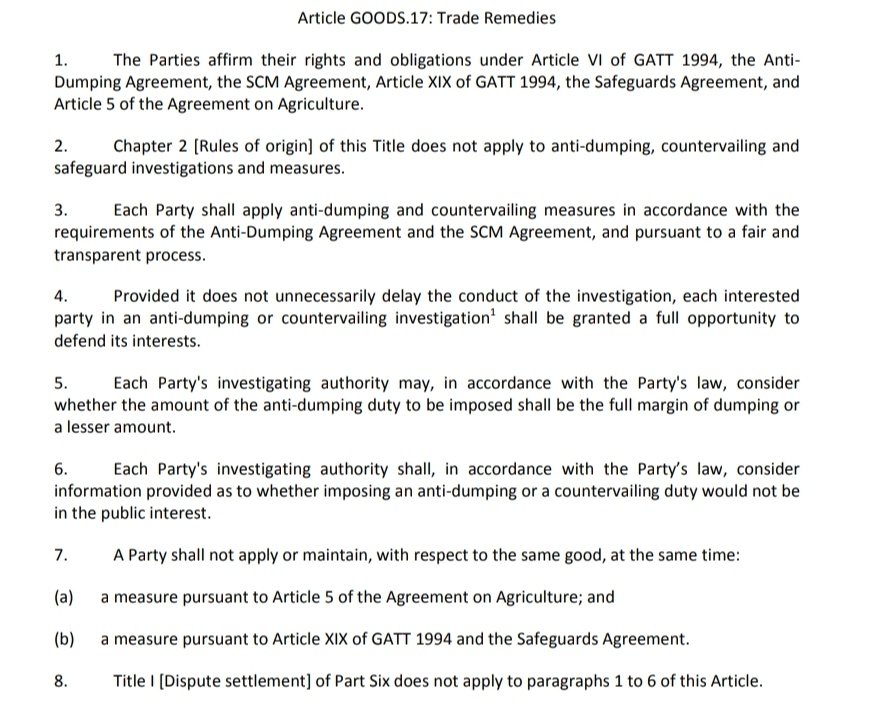
Note: "dumping" here is a purely economic issue about prices of goods. Issues about labour and environmental standards are separate (coming soon). Also see the carve out from dispute settlement. If the UK and EU want to settle an argument on these issues they can go to WTO system
Lots of detail about rules of origin, which are needed to prove that a good originates in UK or EU. This is a new trade friction that follows from leaving the customs union. At least companies have loads of time to prepare for it though! 😀
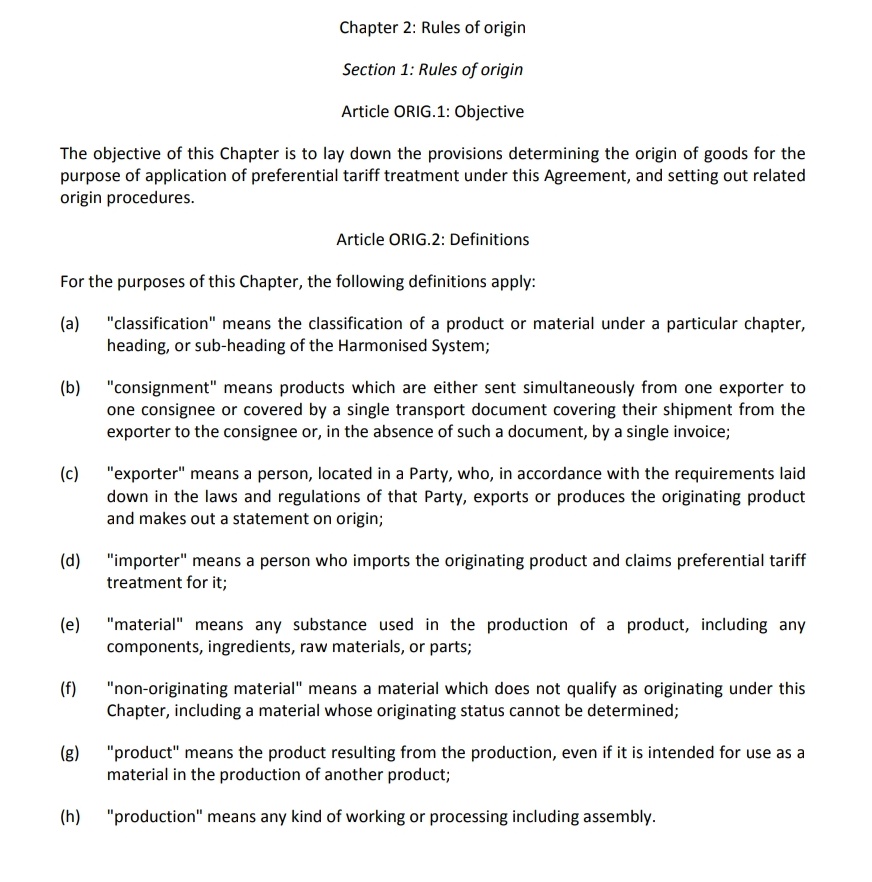
I'm assuming that @SamuelMarcLowe is totally explaining all the details of rules of origin, so let's move on.
Over lunch, I've told @TwitterSupport to stop people tweeting "the UK will cease to exist" at me unless they read a tome on the international law of state succession first.
Detailed rules in the treaty on sanitary and phytosanitary measures. I will leave these to the experts...although note the possible impact here on UK/US talks.
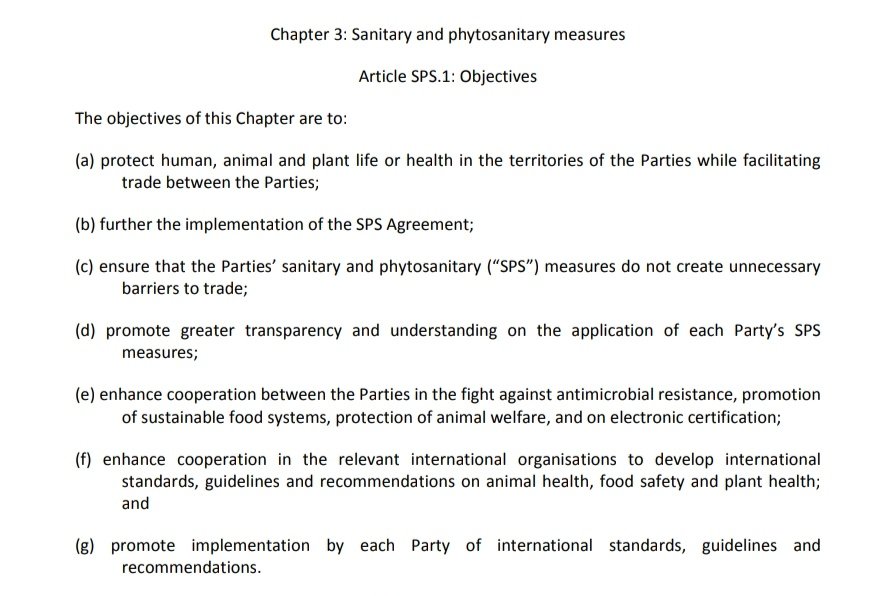
Here's animal welfare though. Bit vague. 🐄🐖🐑🐔🦃
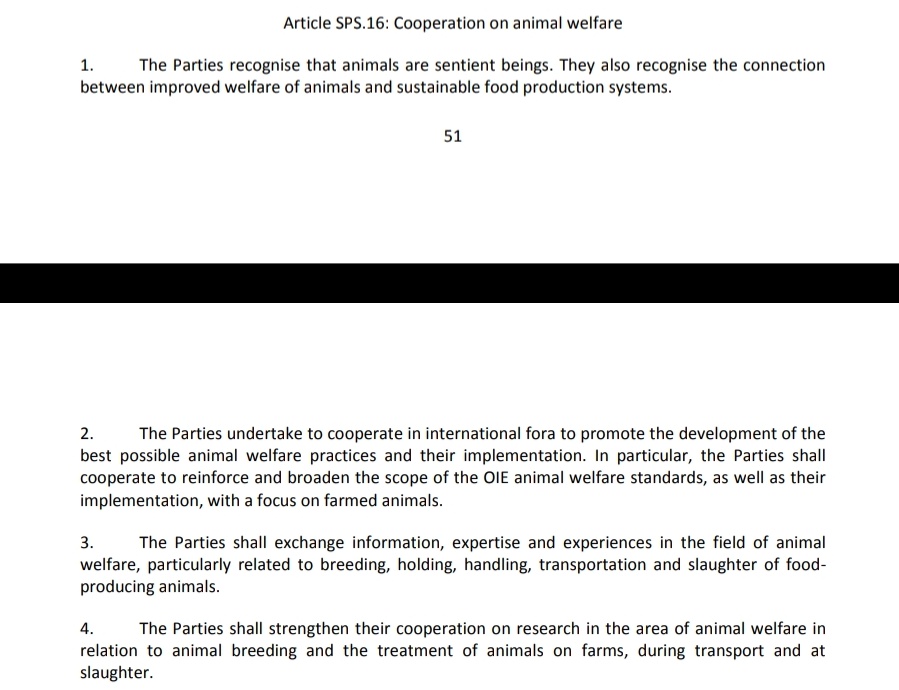
Lots of stuff on technical barriers and customs cooperation. See @AnnaJerzewska for more on the latter.
Services! Note that it doesn't apply to audio visual services or some transport (separate part on aviation though), or to employment and residence. (Despite this, there's some impact on immigration of service providers).
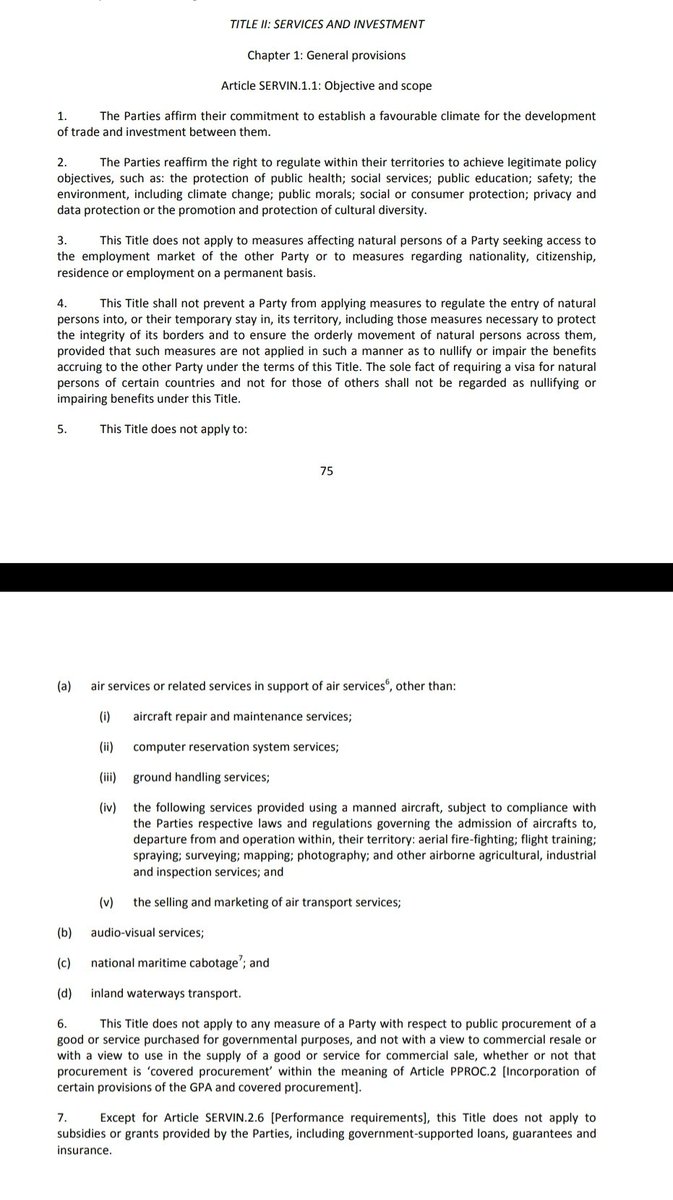
A big chunk on investment by service providers, but I'll jump to admission of natural persons providing business. Here's the categories of people covered. Employment law still applies, and this isn't a route for bringing in scabs to break strikes.
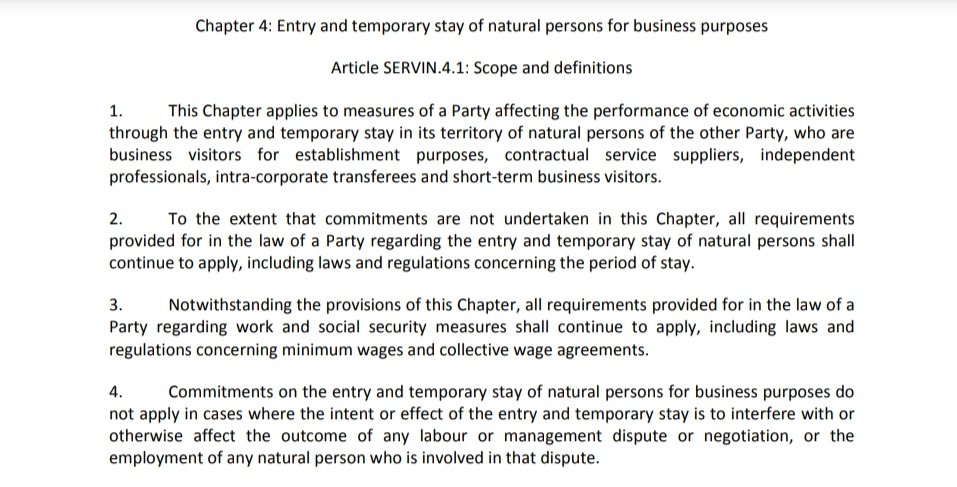
Each category is further defined, and there are conditions and limits. Not "nothing on services", but not free movement of people either.
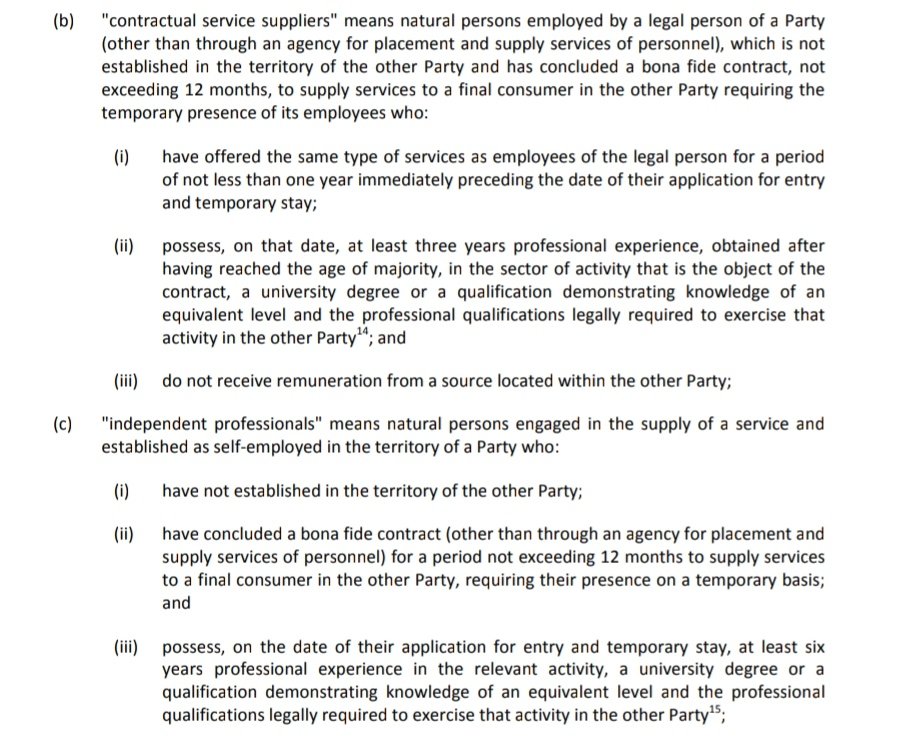
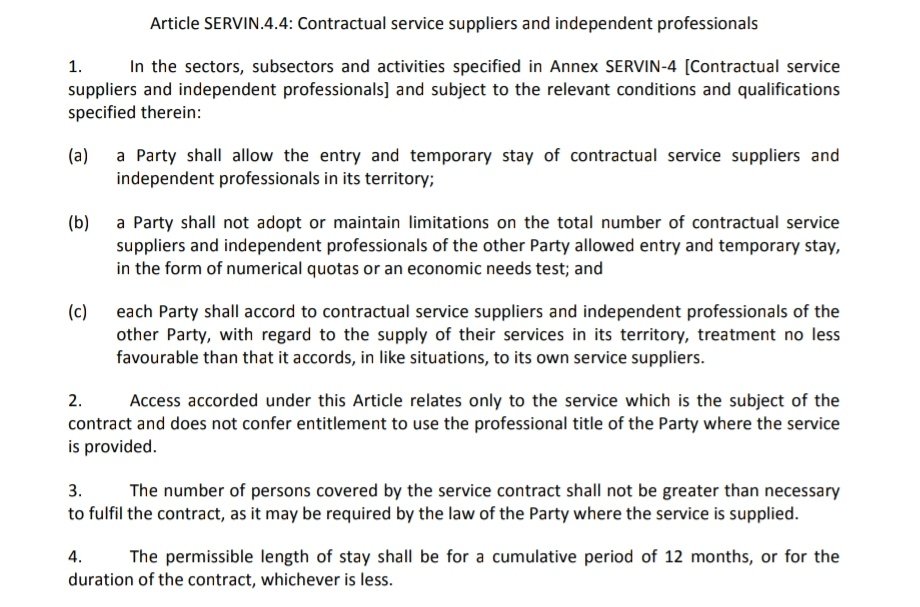
Possible to negotiate on recognition of qualifications later, but nothing agreed for now. Pretty big gap for a country with a big surplus in services exports.
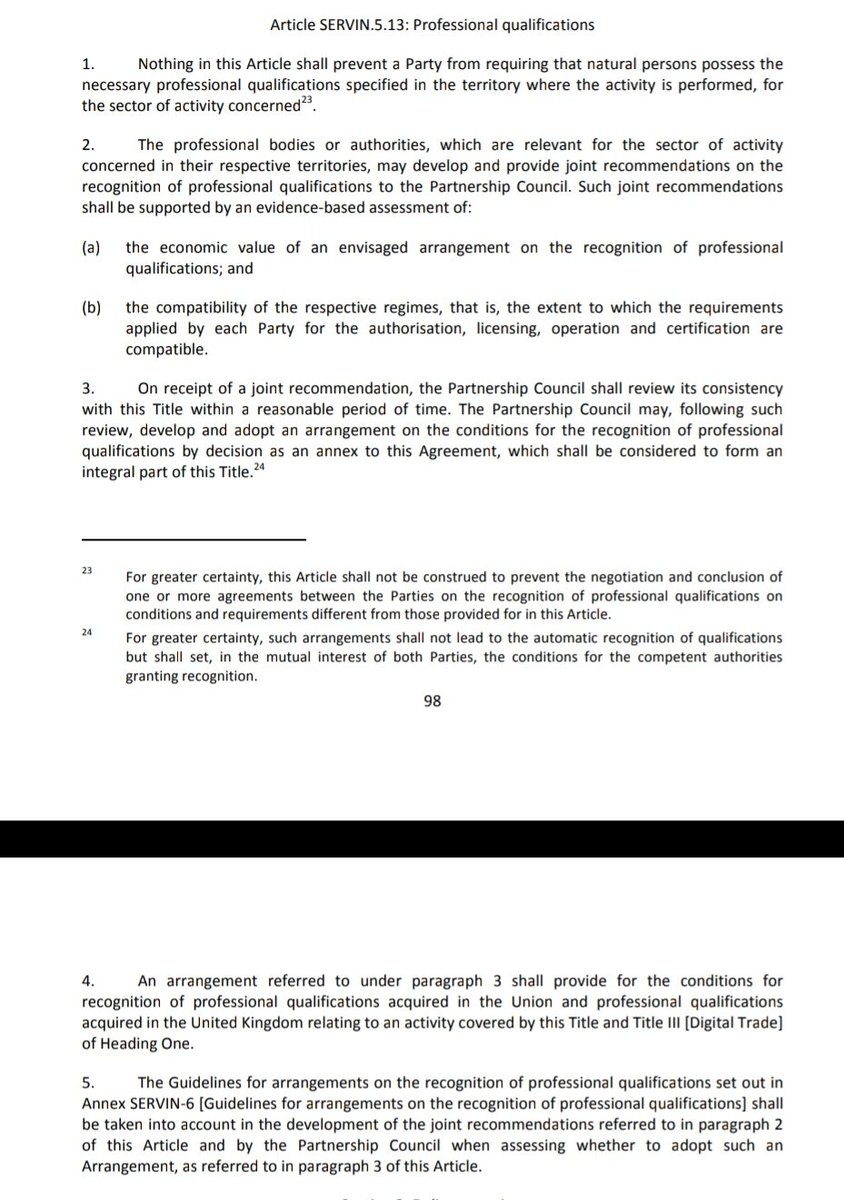
Special rules on delivery services, telecoms, financial services, legal services, digital trade. Clause on mobile roaming charges is basically a green light to charge them...
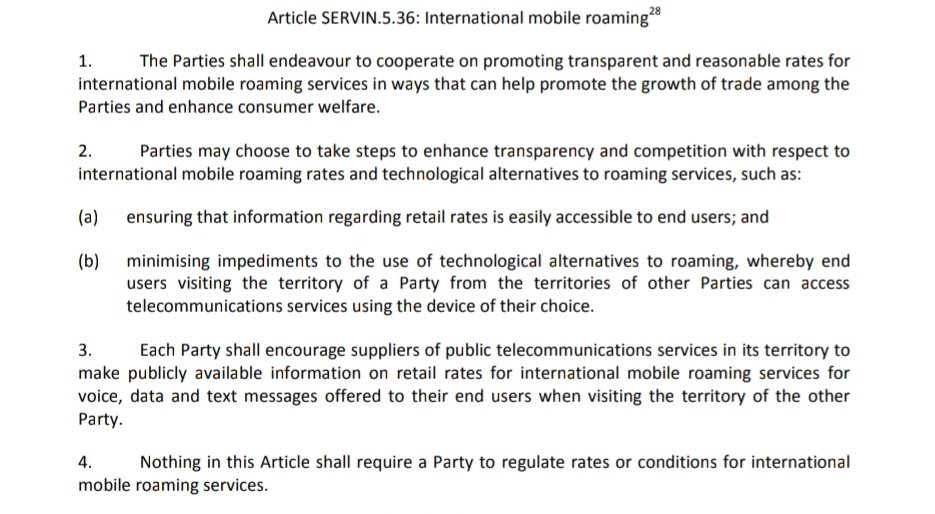
Moving on: detailed obligations on various aspects of intellectual property. Here's part of copyright, for example. Not the same as applying EU law on these issues subject to CJEU jurisdiction, though.
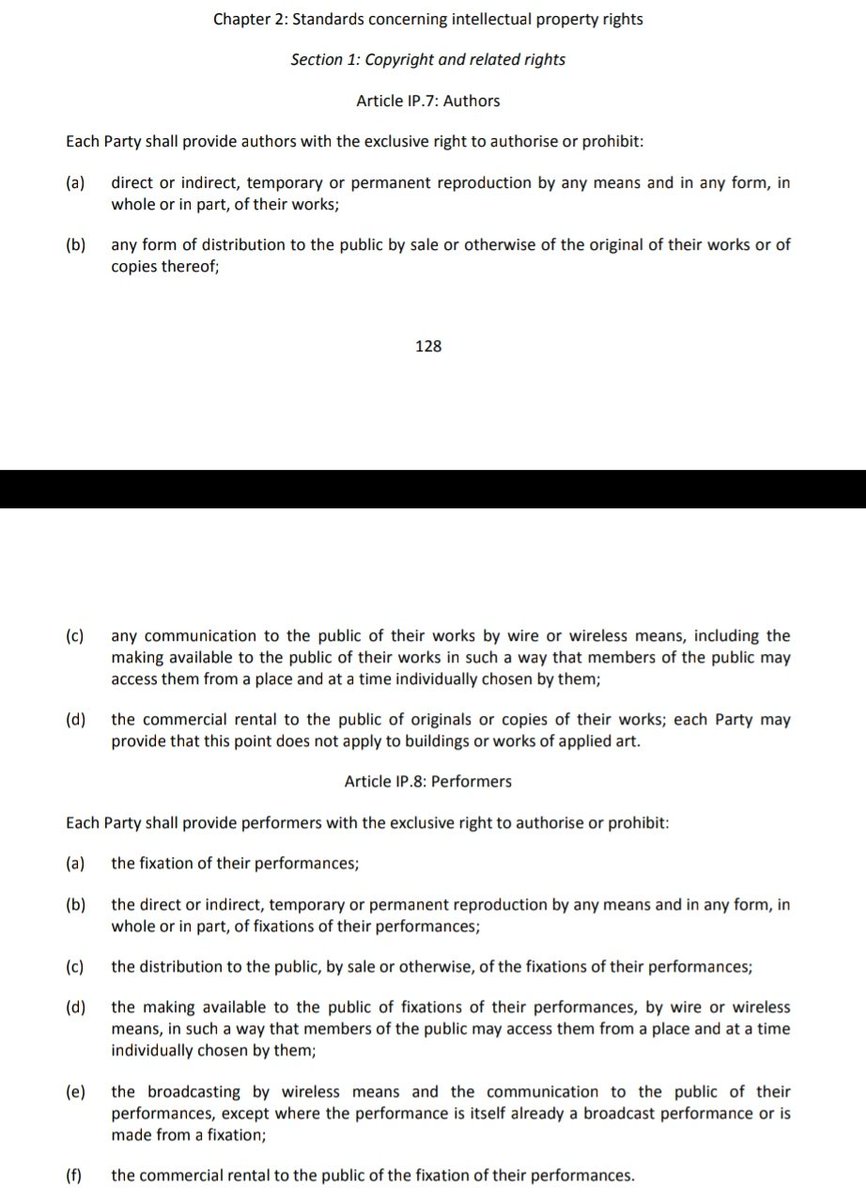
There's a public procurement (government purchases) section, which the UK apparently agreed to after Dominic Cummings' departure. Whether it has any impact on the swamp creatures swimming around government spending remains to be seen.
Brief bit on SMEs, detailed chunk on energy. Remember there's a separate treaty on Euratom. I'll leave these bits to the energy experts...
Ok, I am finally at the level playing field on employment and environmental standards! Where are my Lexit dudes at?
First of all, an obligation to have and enforce competition law. Exempt from dispute settlement tho.
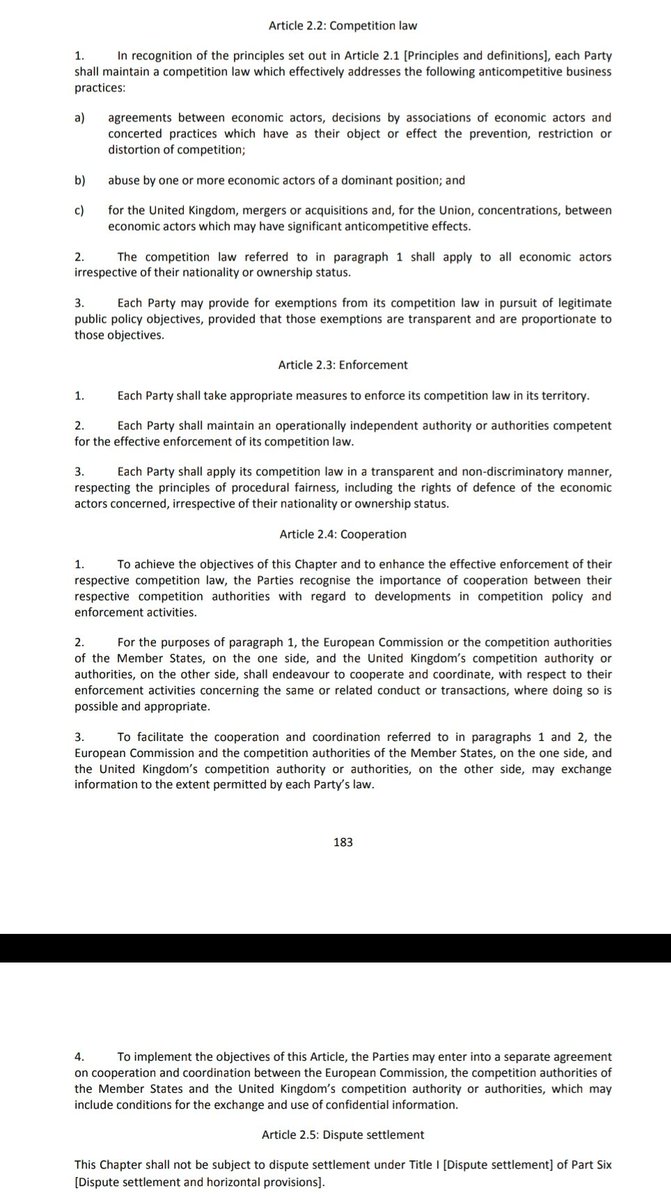
State aid/subsidies. More than the UK wanted; less than the EU wanted (which was continued application of EU State aid law to the UK, including references to the CJEU). Some big exclusions from the scope.
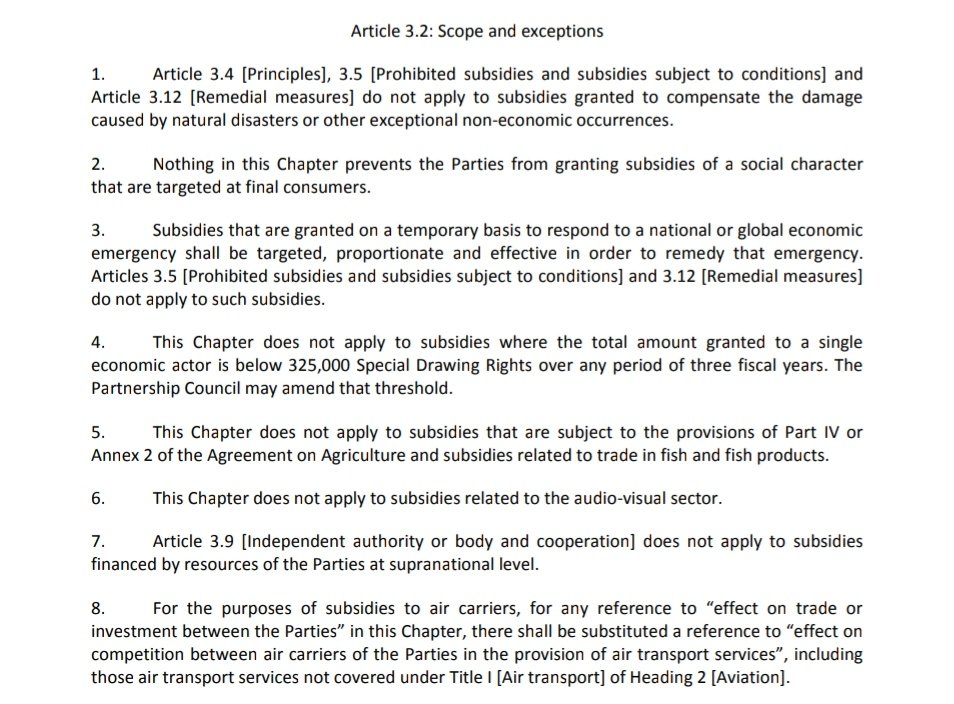
Basic principles on subsidies, which are then further fleshed out.
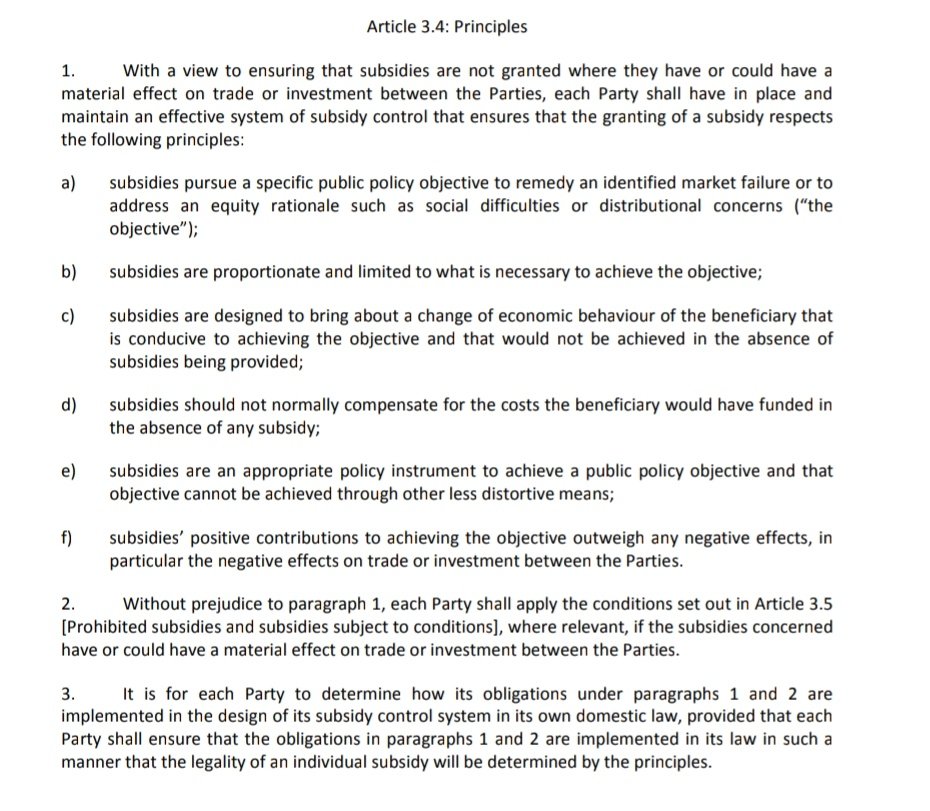
Enforcement: parties have to provide for an independent enforcement body and access to the courts.
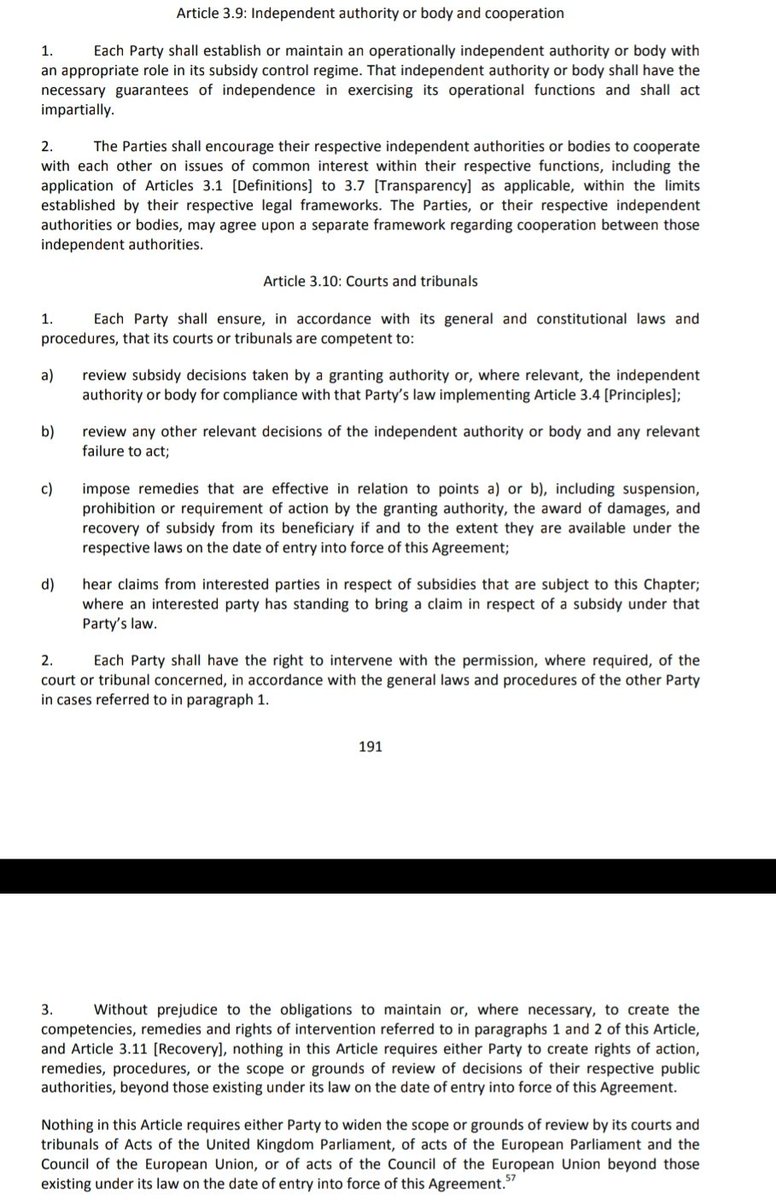
Important point on remedies: national law has to provide for illegal subsidies to be paid back.
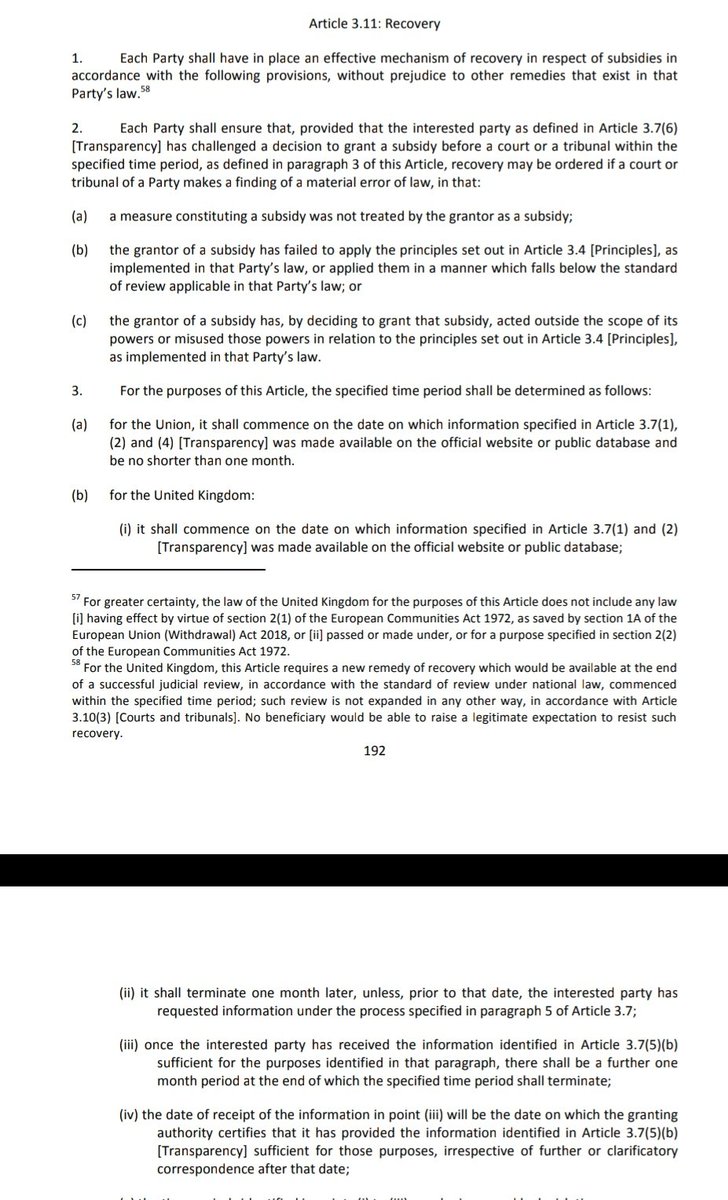
Fast track retaliation against a subsidy, but fast track arbitration concerning the retaliation. No suspensive effect of asking for arbitration, and limits on what the arbitrators can review.
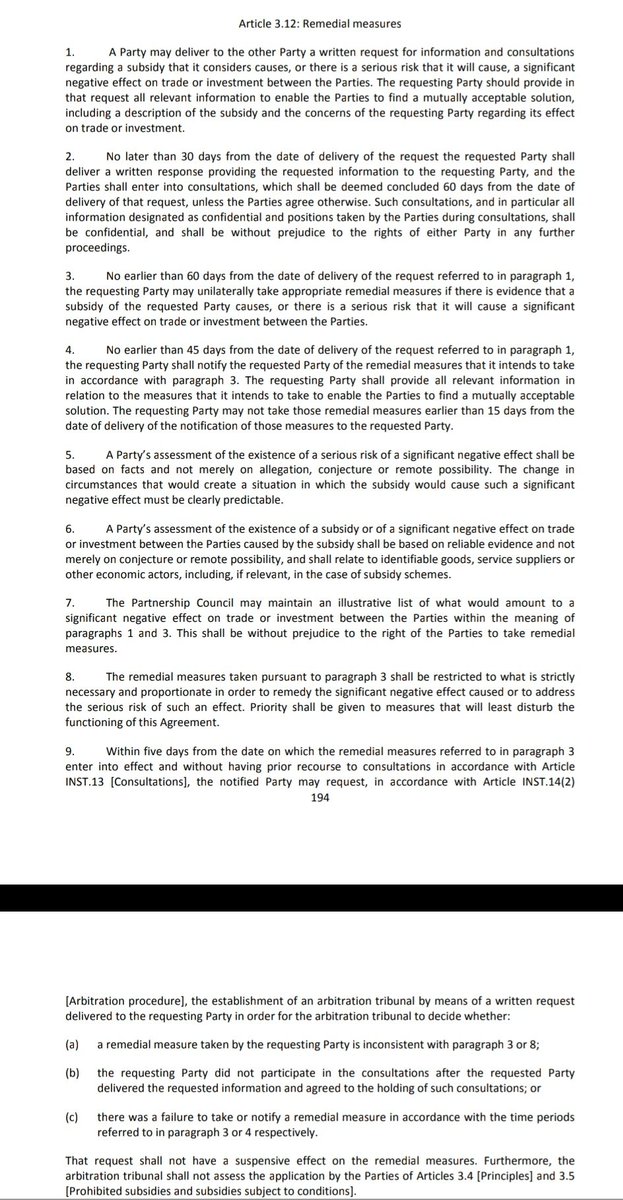
Taxation! A vague reference to international standards, a concrete standstill clause, buuut...dispute settlement is switched off.
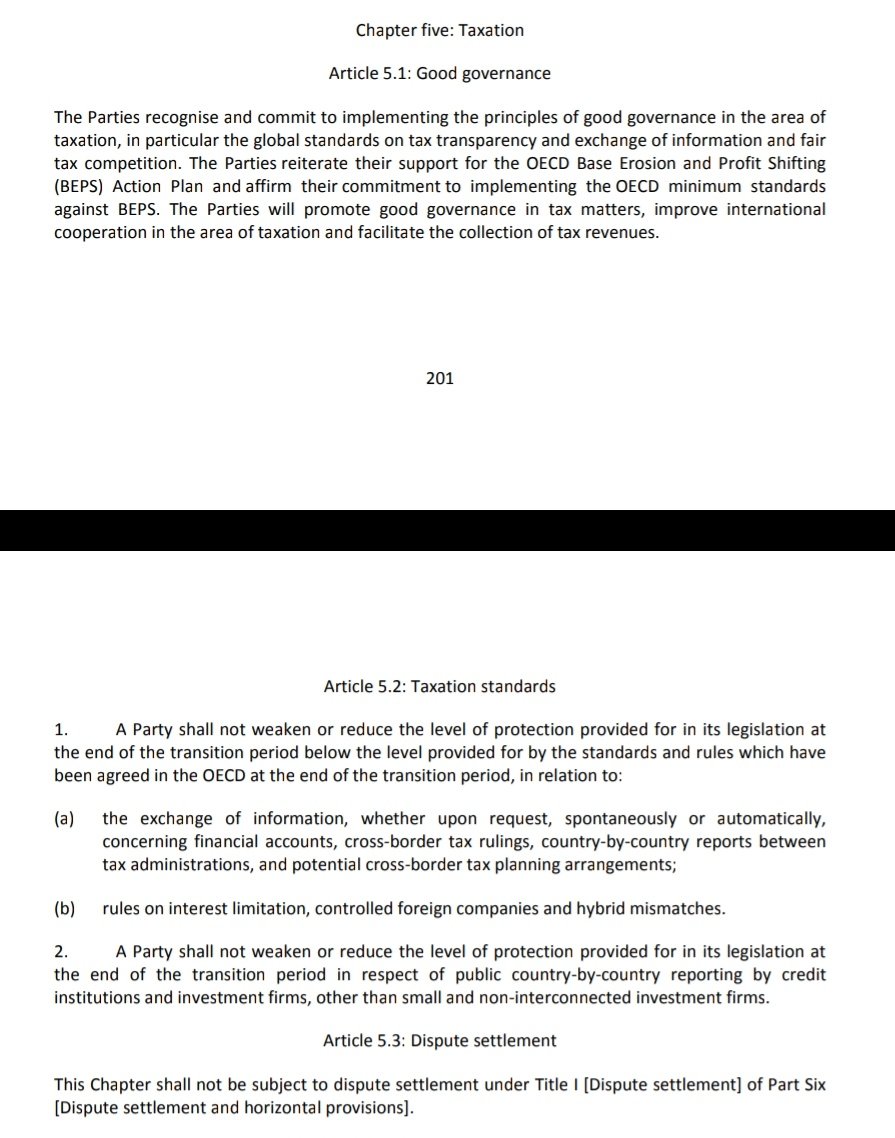
And now we go to a reaction from a spokesman for the tax avoidance industry
Employment law! Lots to unpack here. A broad scope of the obligations, but notice the exclusions for pensions and social security.
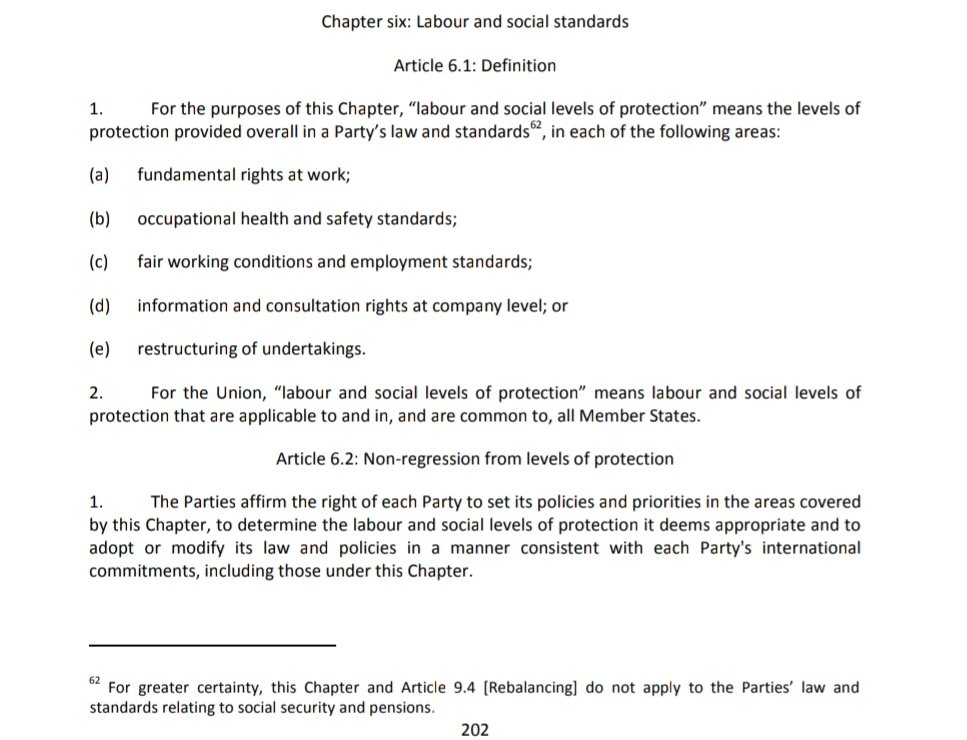
Non-regression obligation. It applies when a party drops its standards "in a manner affecting trade or investment between the parties". That's an easier threshold to meet than the one for divergence re future measures. More on that soon.
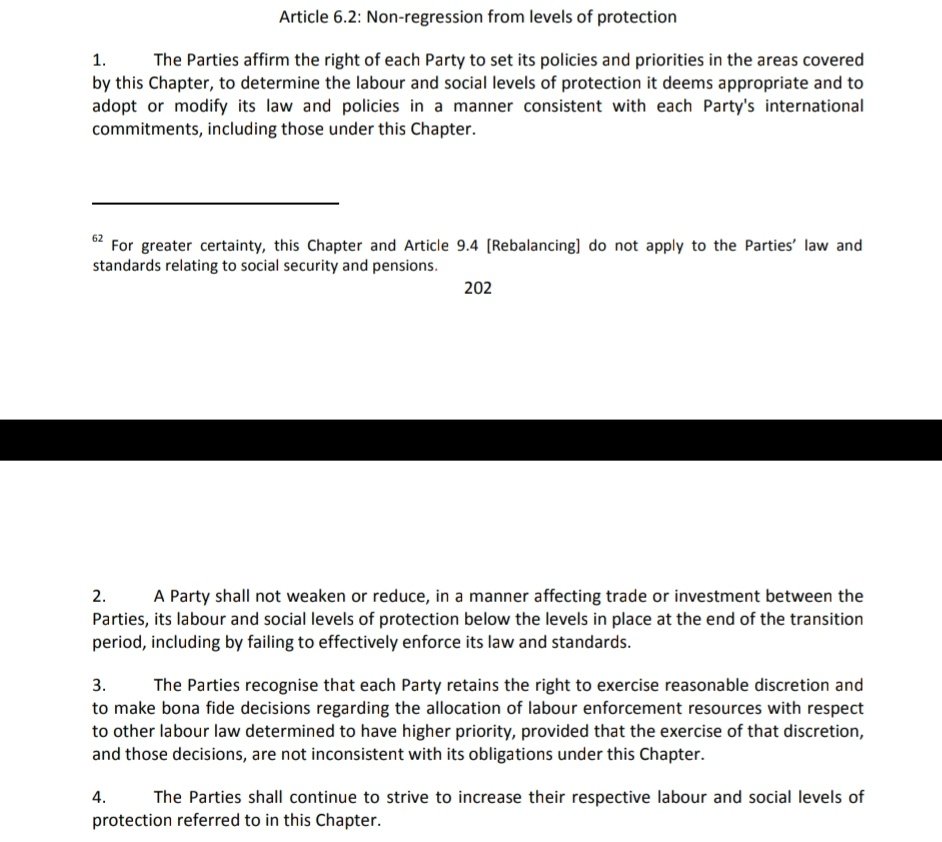
An obligation to enforce labour law effectively...
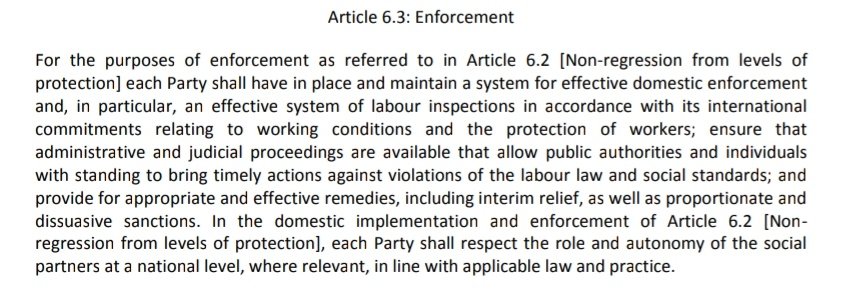
There are different rules on dispute settlement but at first sight the provisions referred to do NOT switch off the key possibility of retaliation in the event of a breach. (As they refer back again to some of the main dispute settlement rules. Not the best drafting technique)

Tl;dr: a reduction in labour standards by the UK (or EU) COULD possibly result in retaliation by the other side. An unscrupulous employer reacts...
Coffee. Chicken sandwich. The "UK will cease to exist" folks are still at it in my mentions. And getting grumpier. Moving on to environmental standards...
The scope of the environment chapter. Note the specific definition of climate issues.
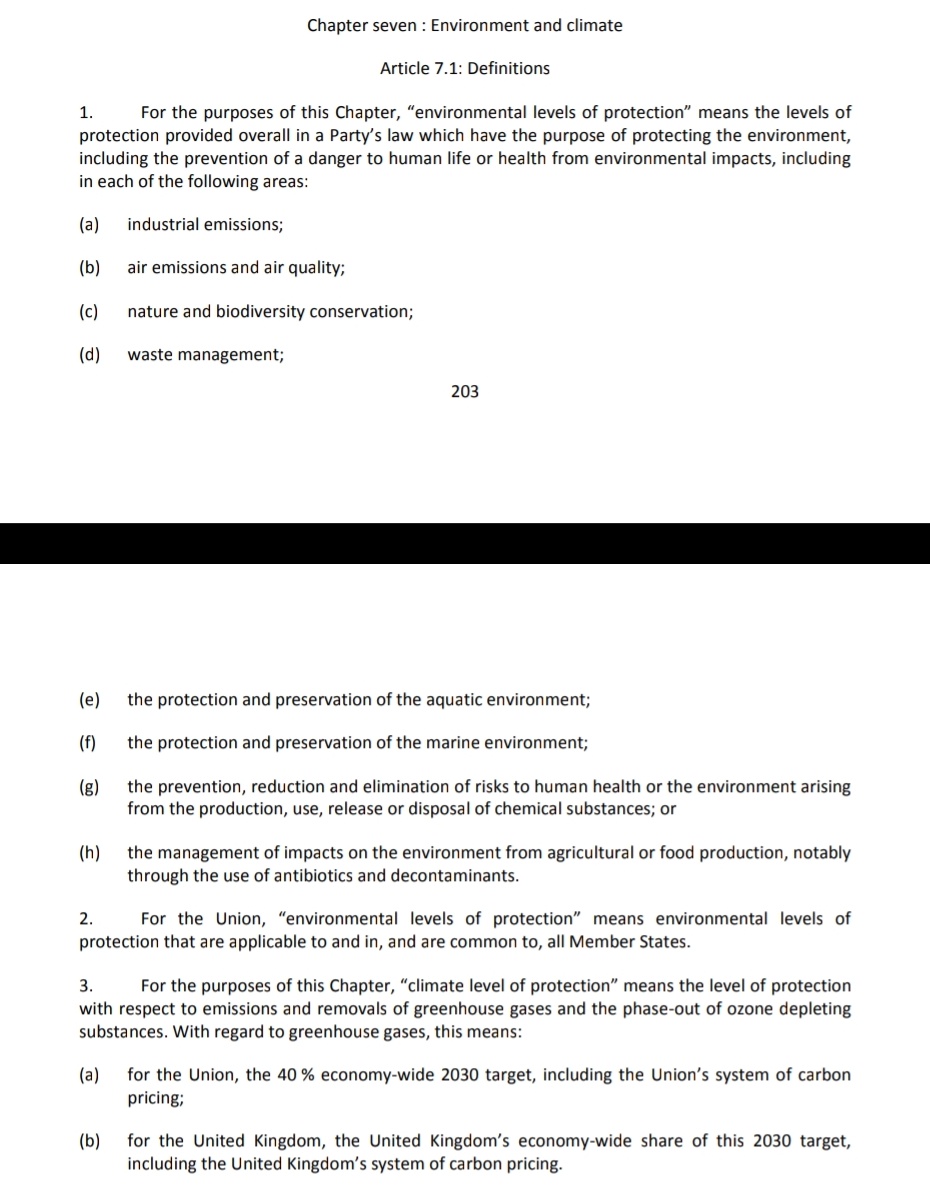
Non-regression on existing environmental standards. Basically the same as the labour standards clause.
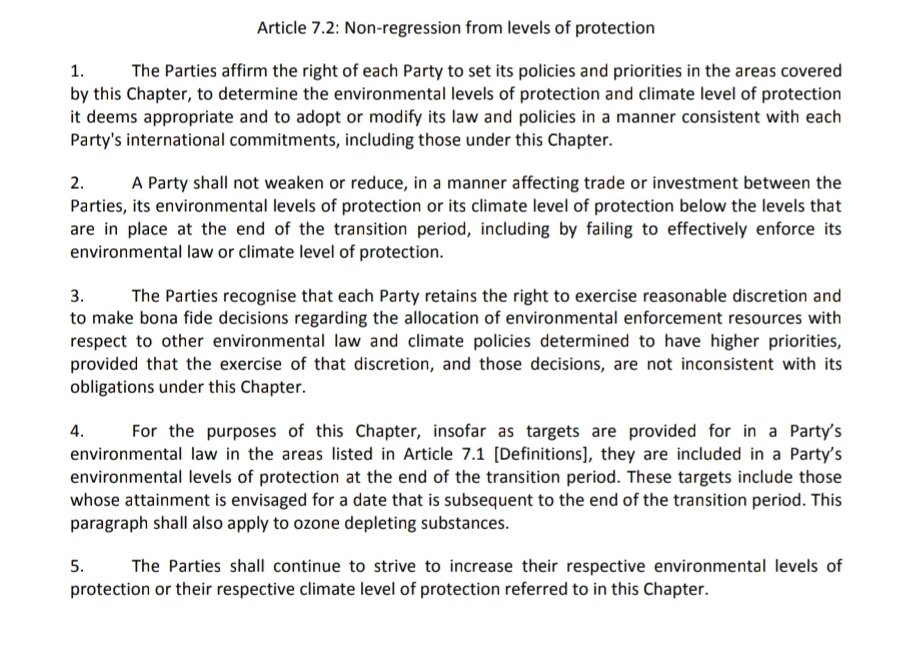
Slightly vaguer provision on enforcement of environmental law compared to employment law. Same provision on dispute settlement.
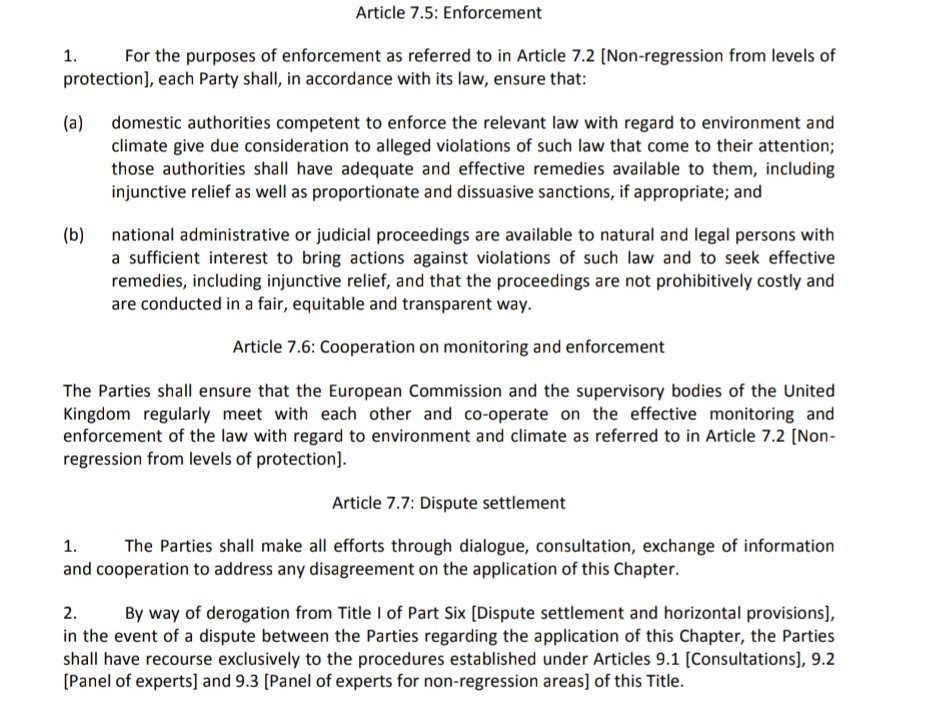
Which means that retaliation for dropping environmental standards is possible. Reaction from the pollution industry...
Future labour and environmental standards! Retaliation in the event of divergence is possible. But it must be a "significant divergence" with a "material impact on trade or investment". Note the higher threshold than for non-regression. There's a fast track arbitration process.
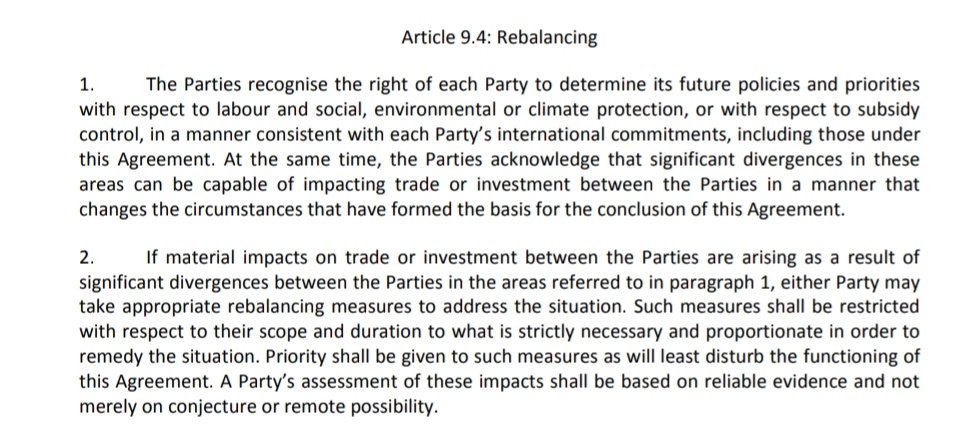
Time for the Boxing Day Walk. More soon...
I'm back! Let's look at the rest of the treaty...
But first, a final point about the level playing field. EU trade remedies law is due to be revised soon, and there's an argument that trade unions and environmental NGOs should be able to bring complaints about issues like these.
Big chunks of text on air transport and road transport. Leaving those to the experts...
There's a protocol on social security. Bat signal to @TamaraHervey to explain it all. Note that: the social security rules in the withdrawal agreement still apply, for those covered; there's reportedly a replacement for EHIC; a health fee can be charged.
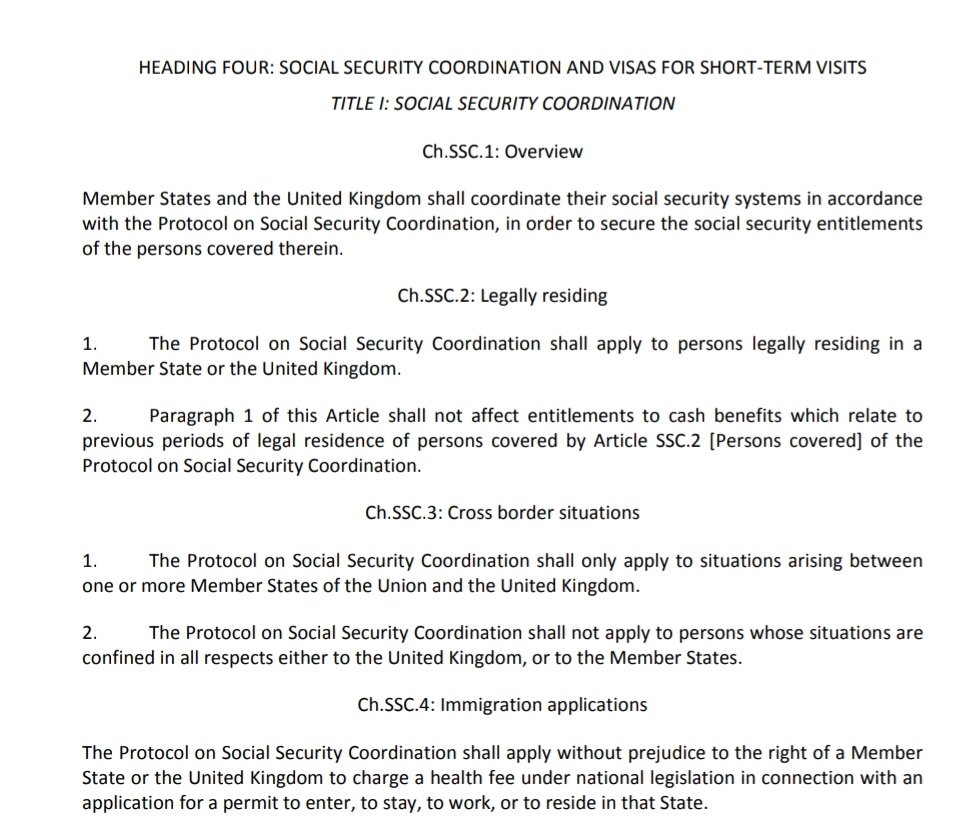
Good overview of impact on various industries, including on parts of the text I'm skipping over, in this thread
Short term tourist visas. Waived as things now stand; UK can't reimpose them on individual Member States. In any event if it did so EU could drop its visa waiver for UK visitors - see EU law which I discussed here:
eulawanalysis.blogspot.com/2019/04/travel…
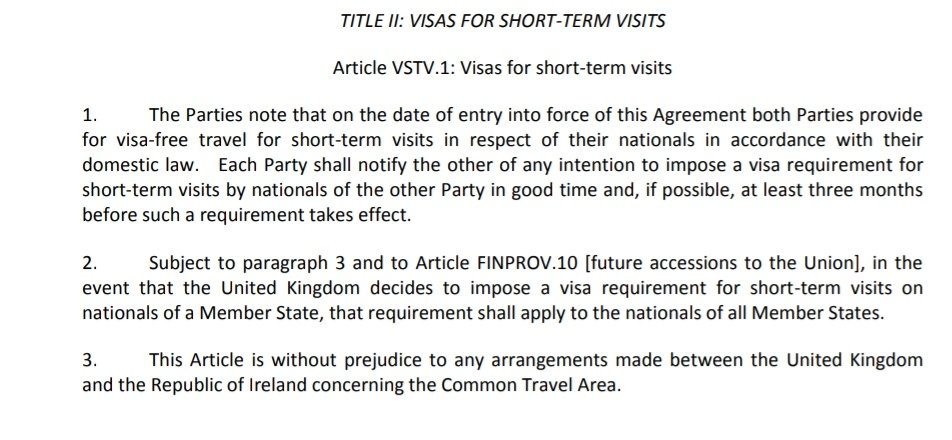
Fisheries! Two points about this part...
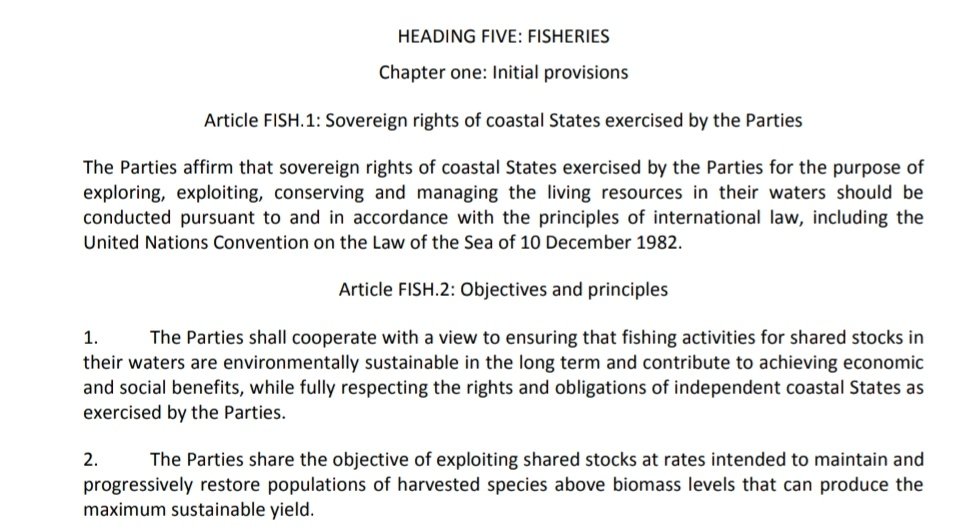
First of all, fishing is not my field, so I refer you to this analysis...
Secondly, I have obtained this EXCLUSIVE footage of John Redwood's reaction to the provisions on fishing
We've reached part three, on criminal law and policing! Back in my comfort zone...
General issues first. The criminal law part is based on protection for human rights, including the ECHR. We'll cone back to how that might be enforced.

A quick reaction from the ERG to those mentions of the ECHR...
The criminal law part is also based on data protection standards. At the start of the thread (which was about March 2011) I pointed out there's a transition period that dare not speak its name on this issue. But it expires soon and the issue of an EU adequacy decision will arise.
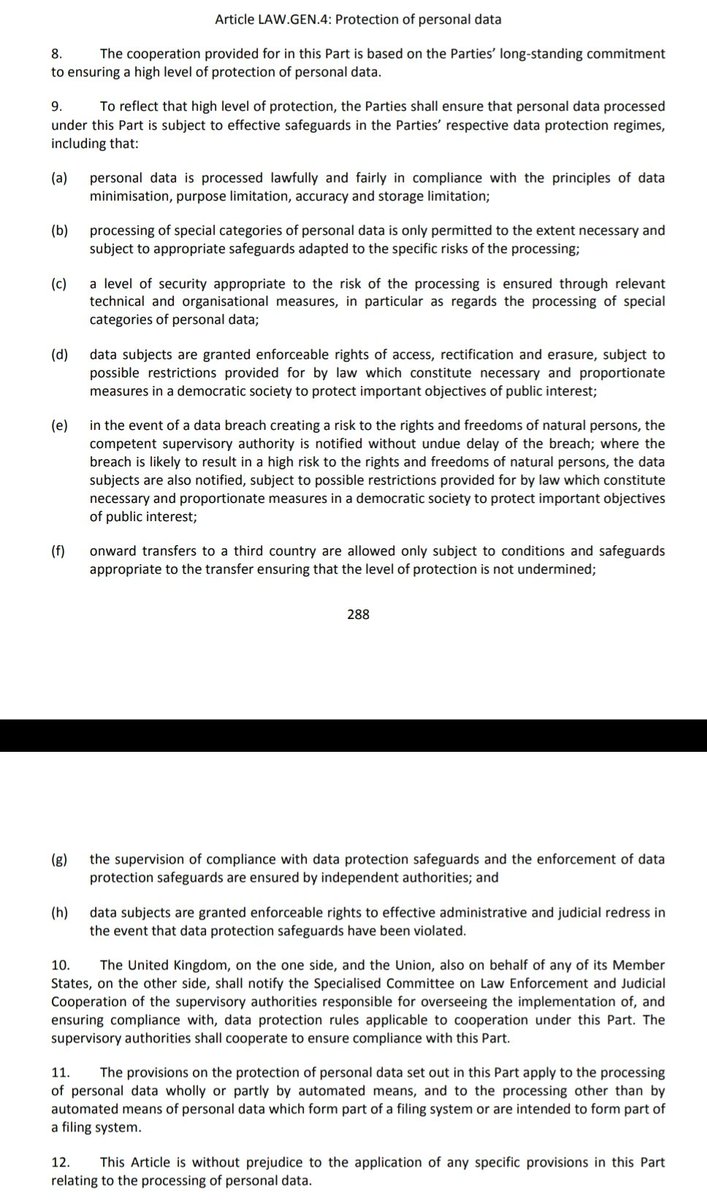
How to enforce this? It's possible for either side to terminate the criminal law part with nine months' notice. There's no automatic termination if the UK leaves the ECHR. But para 2 provides for quick termination if the UK or a Member State does so and the other side reacts.
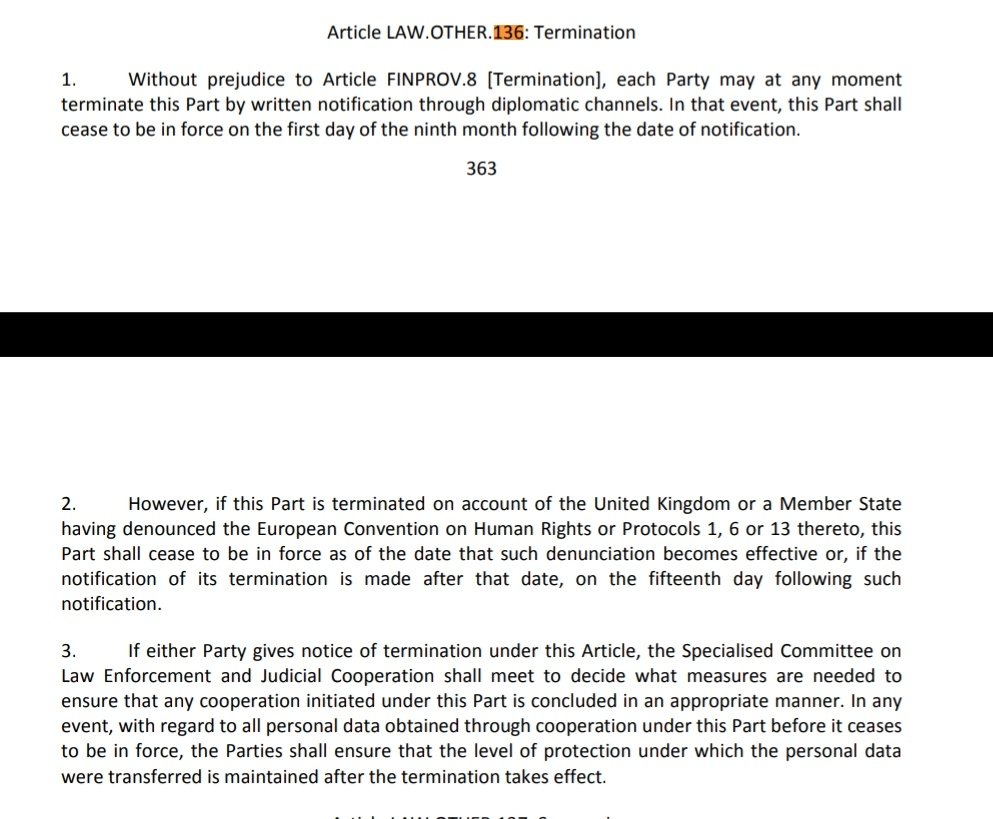
Protocols 6 and 13, referred to also, concern abolition of the death penalty. Yes, I am aware of a tweet saying that the Home Secretary wants to bring it back. There is also a tweet saying that I made a sex tape. So please bring some critical thinking to Twitter.
Having said that, I would be unsurprised by the Home Secretary doing that. Certainly it's more likely than the prospect of me making that tape.
It's also possible for the criminal law part to be temporarily suspended on grounds of human rights, the rule of law, or the end of a data protection adequacy decision.
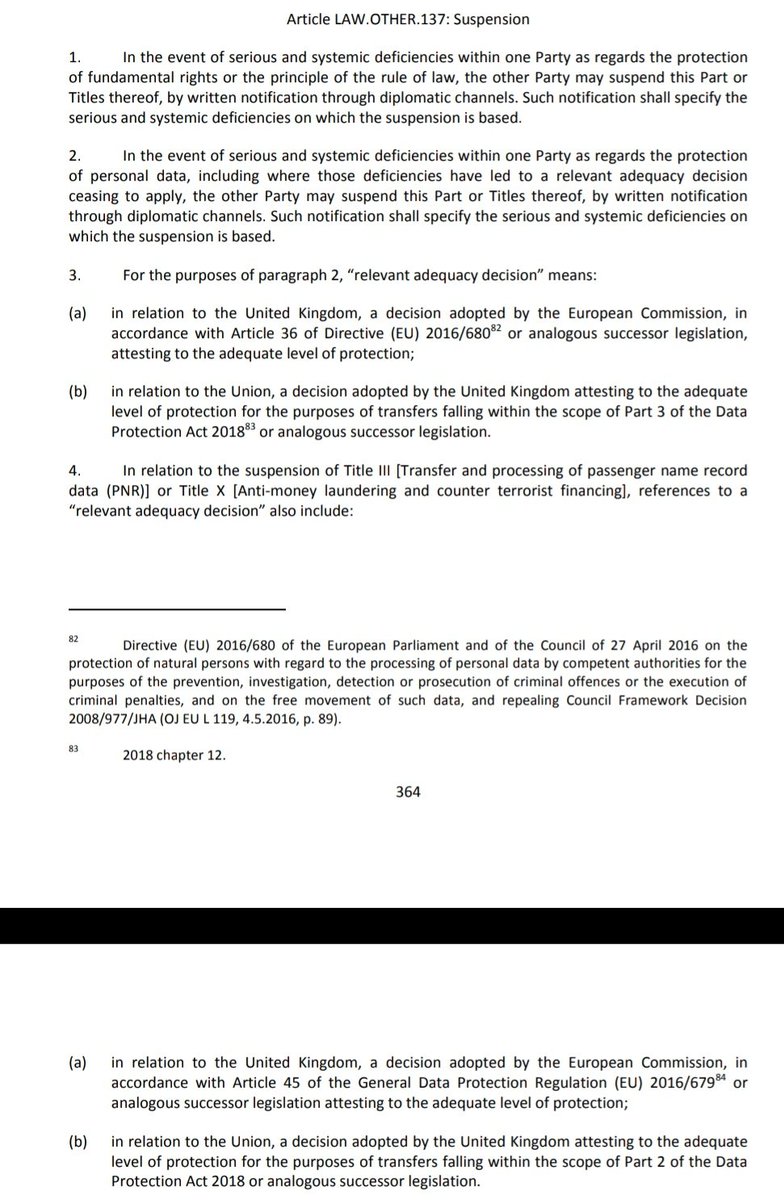
The dispute settlement process re criminal law is completely different than for trade. No arbitration; just political discussions with the possibility of termination etc in the event of no agreement.
Ok, on to the substance. UK will still be involved in "Prum" transfers of data on DNA, fingerprints and vehicle registration, and on passenger name records.
There's cooperation on exchange of operational information, but that falls short of UK involvement in SISII. Cooperation with Europol and Eurojust, but this falls short of membership.
Next, extradition. Fast tracked: likely to be faster than general international law but slower than the European Arrest Warrant. The text is similar to the EAW but with some exceptions. Good overview here:
Having said that I wouldn't slap "win" for either side on the text so much. The texts tabled were similar on some of these points.
Also provisions on requests for evidence, freezing and confiscation orders, money laundering, and exchange of criminal records.
Moving on to dispute resolution...the end is near
There are general rules, but also loads of exceptions, some of which I referred to already.
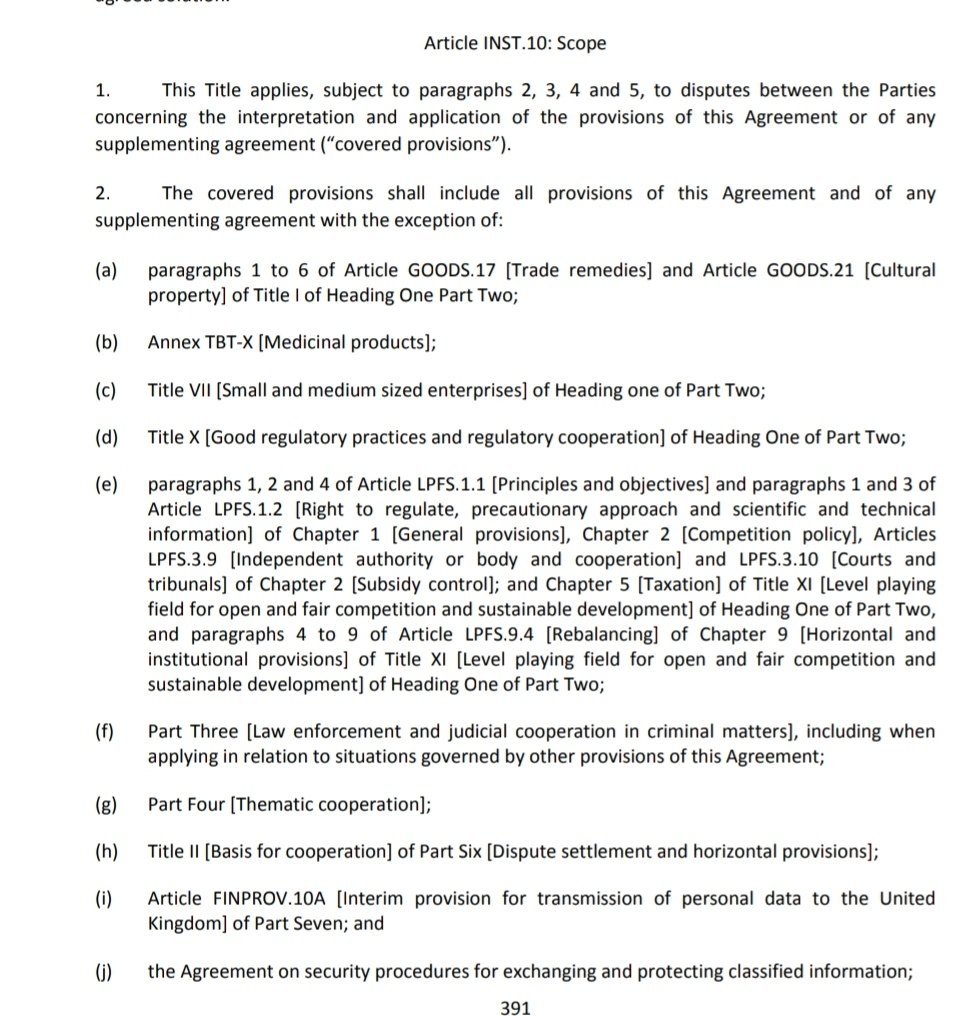
Basically: a dispute goes to consultation. If the parties can't agree it goes to arbitration. The arbitrators give a ruling. If a party was in breach it has a reasonable period of time to comply. The arbitrators might have to rule on how long that is.
If there's no compliance in time the parties can agree compensation, or the winning party can suspend some obligations. This has to be proportionate, and arbitrators can rule on that. Suspension is ruled out in some areas. Cross-retaliation is allowed with limits.
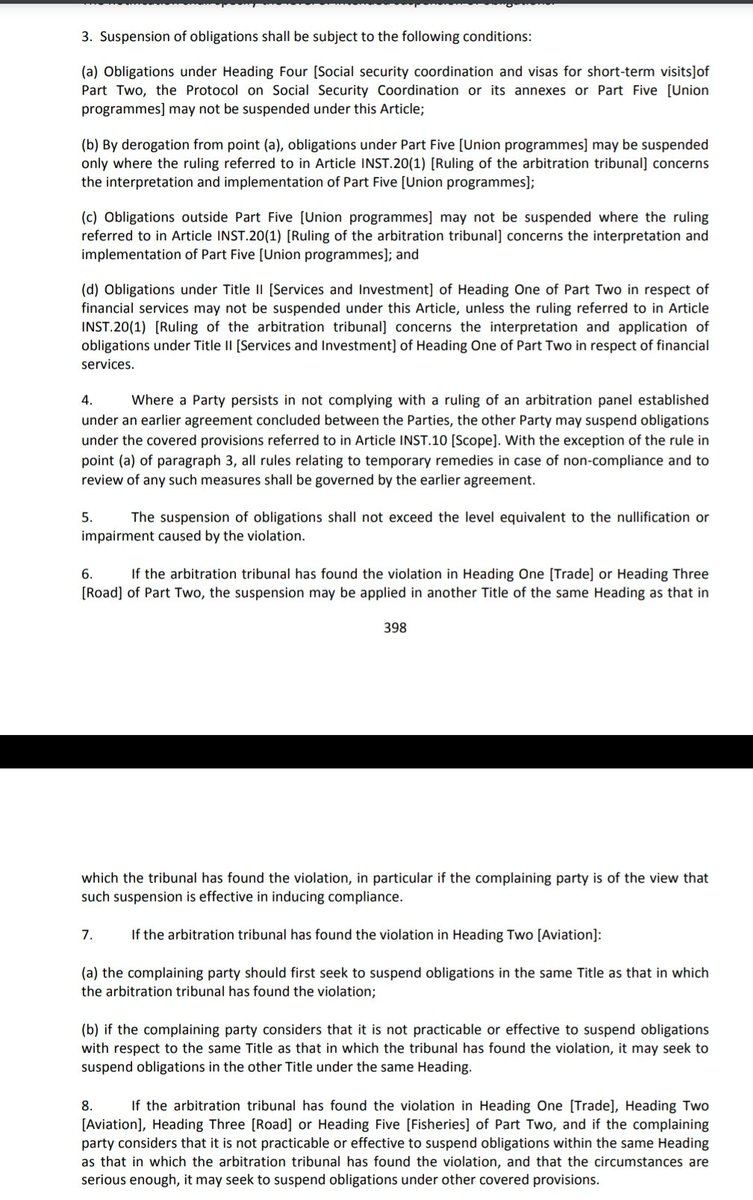
All of which is broadly similar to dispute resolution under the withdrawal agreement, which I discussed in detail here: https://t.co/2aaw2n2c6V One key difference: no possibility for the arbitrators to ask the CJEU questions under the trade agreement.
eulawanalysis.blogspot.com/2019/10/analys…
Ok, after 21 hours, Five Guys has arrived, the beer looks tempting, and so that's it. I might write up a blog post or two, but no rush: it's not as if this will all apply in only six days' time.
